




Members of the European Parliament visiting Europe Café in Chișinău
European Week of Sport 2022 marked in the Republic of Moldova
A new match of Oina Game was organised in the Republic of Moldova to mark the European Week of Sport 2022
Conservation of the Rașcov synagogue and church with EU support
“Help to our little friends” – an EU-funded project that supports the improvement of legislation in the field of animal protection
35 Years of Erasmus+ in the Republic of Moldova
EU supports capacity building of civil society organisations in the Republic of Moldova by strengthening their anti-burnout resilience
EUBAM continues to facilitate Solidarity Lanes ensuring uninterrupted agricultural export from Ukraine
18 more fellow interns of the EU-funded innovative internship programme receive their award certificates
Most active youth from Străseni and Fălești in the field of gender equality promotion were awarded
Young people from 25 schools countrywide presented their ideas in a dedicated business competition
Legal consultations and psychosocial support for refugees from the north of the Republic of Moldova, provided with the support of the European Union
European Union Solidarity Programme against COVID-19 comes up with a new intervention to support the activity of civil society organisations in the Republic of Moldova
Civil society actors from the Republic of Moldova – drivers of change for a better life, with the financial support of the European Union and Team Europe
EU and Team Europe support the independent local media in Moldova to strengthen their capacities
The first IT classroom for prisoners inaugurated at Penitentiary no. 4 in Cricova with the support of a EU-funded project
The consultative working group of the Ministry of Labour and Social Protection started the development of the methodology on calculating the social services costs
Mobile team for people with disabilities - a new social service launched in Bălți with the support of the European Union
The European Union and the Soros Moldova Foundation donate a minibus to the Day Centre for children with disabilities in Cahul
Roberta Metsola, the President of the European Parliament, visited Europe Café
Efficient enforcement of the competition law and policy according to the EU best practices in view of EU accession
Equality bodies across South and East Europe equipped with new tools to address hate speech
Team Europe: EIB supports modernisation and expansion of Moldova’s public healthcare sector with €498 000 grant agreement
A new EU-funded project to strengthen social accountability of the local and central government in Moldova was launched
EUBAM organised six trainings tackling fight against smuggling
Anticorruption Donors Network, kicked off in Chișinău
The Customs Service is strengthening its communication efforts, with the support of the European Union
Public office gaps addressed in the context of the development of the new public administration reform strategy
Audit Reports on local policies on gender equality presented in four rayons of the Republic of Moldova
Nisporeni Local Public Authorities trained on Costing of Public Investment Projects, with the support of a EU technical assistance project
Nisporeni public authorities trained in financial analysis and risk assessment, with the EU support
Spatial data for the sustainable development of the Republic of Moldova –international conference organised with the EU support
Autumn rich in events within the EU Twinning project “Improving spatial data services in the Republic of Moldova following the EU standards”
Permaculture concept, promoted in Moldova with EU support
A new social enterprise – “ARA Training Centre” – launched in Soroca, with the support of the European Union
European Commission and EIB initiate feasibility study to better connect Ukrainian and Moldovan railway networks with EU
Supported by the European Union, the spouses Carauș from Negurenii Vechi village are developing their business in agriculture
International Trade Facilitation Forum highlights the importance of Moldova as a key bridge for EU-Ukraine Solidarity Lanes
The Republic of Moldova becomes the first country in the region to achieve mutual recognition of authorised economic operators with the European Union
EU4Moldova: Local Communities programme officially launched
LEADER achievements in Moldova and future perspectives on rural development addressed at the EU-Moldova LEADER Conference, 2nd edition
The first Tourism Accelerator in Moldova, launched with the EU and Team Europe support
EU continues to provide further support to Agriculture, Rural Development and Food Safety in the Republic of Moldova through its Twinning project
69 62 70 64 72 76 79 81 83 86 88 89
66
„Ion Vatamanu” Lyceum from Strășeni municipality becomes energy efficient with the financial support of the European Union
Lyceum ‘Holercani’ from Holercani village, Dubăsari raion – renovated from energy efficiency perspective with the financial support of the European Union
By using biomass boilers in public institutions, the consumption of gas may be reduced by up to 20 million m3 of gas a year
Team Europe: EU and EIB enhance support for green, sustainable and energyefficient Moldova through €15 million EU grant
Public buildings in the Republic of Moldova will be energy efficient with the financial support of the European Union and the Team Europe
EUGreenDeal4Moldova – EU support towards reducing the environmental footprint of human and economic activities
The most active pupils and municipalities were awarded within the European Sustainable Energy Week in Moldova
More and more local public authorities aim to develop Local Action Plans for Sustainable Energy and Climate
A platform for dialogue on the Municipal Development Cooperation established by the Covenant of Mayors-East
European Union supports the Republic of Moldova to strengthen its greenhouse gas monitoring, verification and reporting capacities
Water monitoring and accessibility of environmental data for health protection in Moldova supported by EU4Environment Water and Data
106 108 109 111
Five key questions that shaped the Eastern Partnership Digital ConferenceEU4Digital
EU4Digital stakeholders review achievements and plans as EU4Digital Facility Phase II kicks off
EU4Digital Facility second phase kicks off with Eastern Partnership Digital Conference
22 most innovative teachers from the Republic of Moldova were awarded during the “Innovative Teachers’ Gala”
EU4Moldova: Startup City Cahul: digital competencies, a must-have for the public servants of Cahul municipality
EU and Team Europe bring technology closer to the pupils of the High School of Giurgiulesti, Cahul rayon
2nd edition of Innovation Talks, organised in the southern region of the country with the EU and Team Europe support
112 116 118 120 124 126 128

Members of the European Parliament visited the most important EU Information Center, Europe Café, to meet the Young European Ambassadors. The visit was part of the 12th meeting of the EUMoldova Parliamentary Association Committee organized in Chisinau.
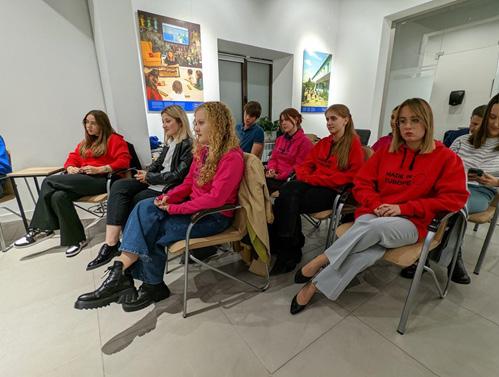
Siegfried Mureșan (Romania), Maria Grapini (Romania) and Helmut Scholz (Germany), along with the EU Ambassador, Jānis Mažeiks, answered questions addressed by the most curious participants about the EU membership perspective of the Republic of Moldova, regional and energy security, rule of law and democracy, digital and green transition.
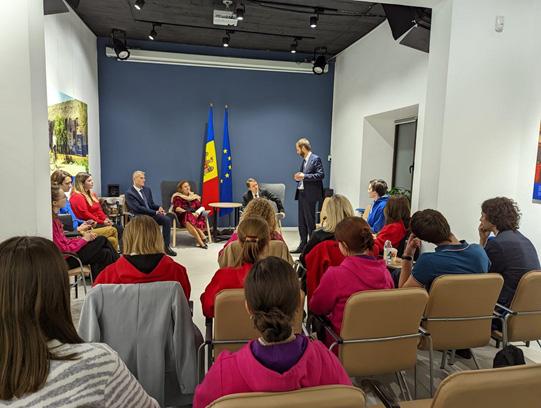
Every year, in the period of 23 to 30 September, the European Week of Sports promotes more active, healthier lifestyles to millions of people in Europe and beyond. Under the overarching campaign slogan #BeActive, every year, the European Week of Sport helps to tackle the inactivity crisis by encouraging people to embrace a healthy and active lifestyle.
In 2022, the 8th edition of the European Week of Sport was opened in Prague on September 23, and the official date of the
Week was until September 30, while the events and activities were implemented and celebrated along the year. #BeActive communities are expanding and spreading the message about the value, importance, and fun of doing sports or physical activity of any kind.
Meet our European Week of Sports Heroes in Moldova and get inspired at: https://eu4moldova.eu/european-week-ofsport-2022/

Every year, European Week of Sport is marked by encouraging people to adopt a more active and healthier lifestyle.

In the Republic of Moldova, the European Week of Sport 2022 took place in the week of 23 to 30 September, concluding on 24 September with a game of Oina, which is part of the cultural heritage of the Republic of Moldova.
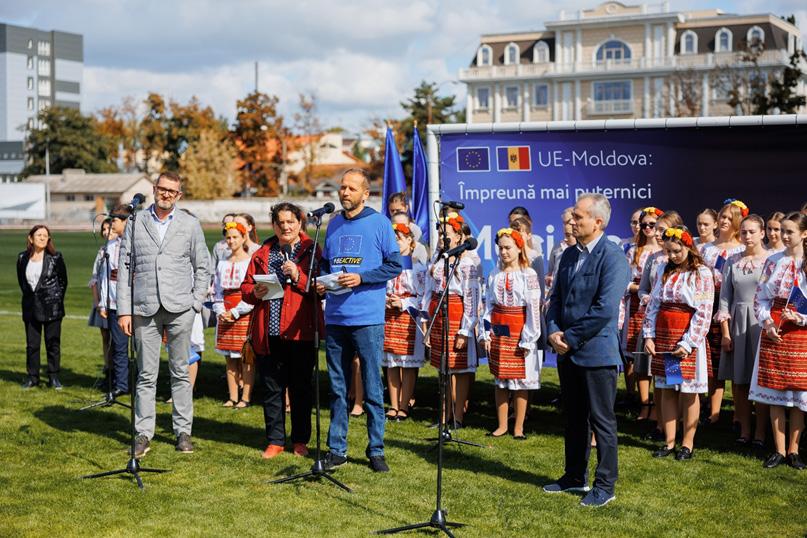
In the spirit of Team Europe, the match included the Oina Super Cup, which was played between the national Oina team and the champion team of the Republic of Moldova “Speranta” from Grozesti, Nisporeni
rayon. Afterwards, representatives of EU Member States’ embassies and Moldovan state institutions played a friendly Oina match.
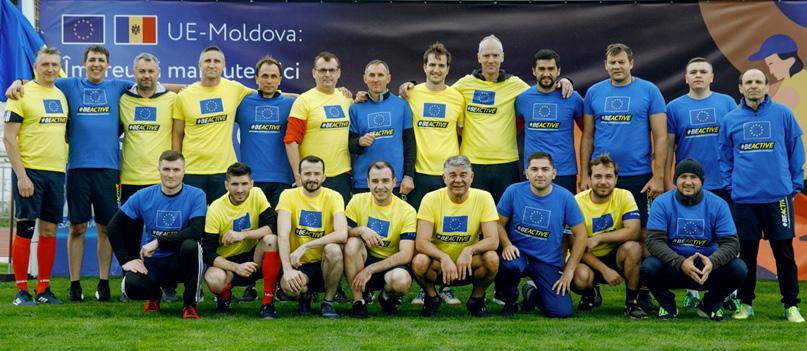
During the event, guests visited an exhibition of handicrafts made by local craftsmen and enjoyed a folklore performance of the local
artists. The Oina game, organised as part of the European Sports Week, ended with a traditional horde.
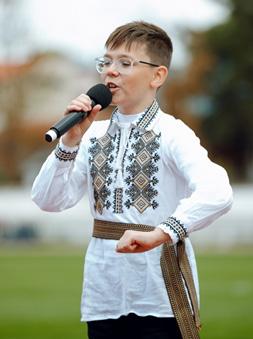

Together with Team Europe, the Oina game was organised in partnership with the Oina Federation of the Republic of Moldova and the Romanian Oina Federation.


The conservation works of the synagogue and church from Rașcov village, located on the left bank of the Nistru river, have been completed. This was possible thanks

to the EU support provided within the EU Confidence Building Measures Programme, implemented by UNDP Moldova.
The village of Rașcov, located on the left bank of the Nistru river, is known for its picturesque landscapes and ethnic diversity. Polish, Armenians, Ukrainians, Moldovans, and Russians have been living there for years and Jews constitute more than half of the population.
“People are living in peace here. The village of Rașcov demonstrates that people of different religion, speaking different languages, having different cultural traditions can live together in a multi-ethnic and compact community.”, says Oleg Bersadschii, mayor of Rașcov village.
“There aren’t any other constructions of this type in Moldova. The stone décor, built in the Baroque and Rococo styles, has been preserved. The building is outstanding and has a lot of visitors,” says Olga Slivca, director of the Rașcov museum.
In addition to various places of worship, there are several cemeteries, two of which being Jewish.
“After visiting the synagogue, people go to visit the cemeteries, as well. In such a way the grave of the Rabin Shabtai, the founder of the Hasidic movement in this region, was discovered at one of the cemeteries,” says local councillor Alla Lopatin.
Pilgrims both from Moldova, and from the international Jewish community come to visit Rașcov.
Locals tell that the Rașcov church was built in 1740. According to some other writings, Ruxandra, the daughter of Voivode of Moldova Vasile Lupu, was exiled to this community. She used to come to the church and admire Moldova’s landscapes over the Nistru river. In the 18th century, the church was considered Greek-Russian and in 1894 it became Christian Orthodox. In the 1930s it was turned into a grain barn and was heavily damaged.
The conservation works lasted for several months and follow the national and international standards of heritage preservation.
“No standard consolidation works are allowed on such historic buildings; interventions should be minimal, therefore we use a special diamond drilling at a certain level of humidity, as it is essential that these walls are reinforced. We should preserve the existing
historical heritage. We cannot change these walls and this plaster in order not to affect the building’s exterior and interior aspect,” explains Iurii Kriklivets, deputy director of the company that carried out the conservation works.
Local public authorities are planning to attract tourists to visit Rașcov.

“Tourism will help us develop the local infrastructure, which is very important. Demand also generates supply. We hope that small hotels or guesthouses will open and this will encourage young people to stay in the village,”
The synagogue and the church of Rașcov are among the 10 cultural-historical sites on both banks of the Nistru river, selected for restoration and conservation under the cultural heritage component of the EU Confidence Building Measures Programme. The programme contributes to building trust between people on both sides of the Nistru river by involving them in joint development
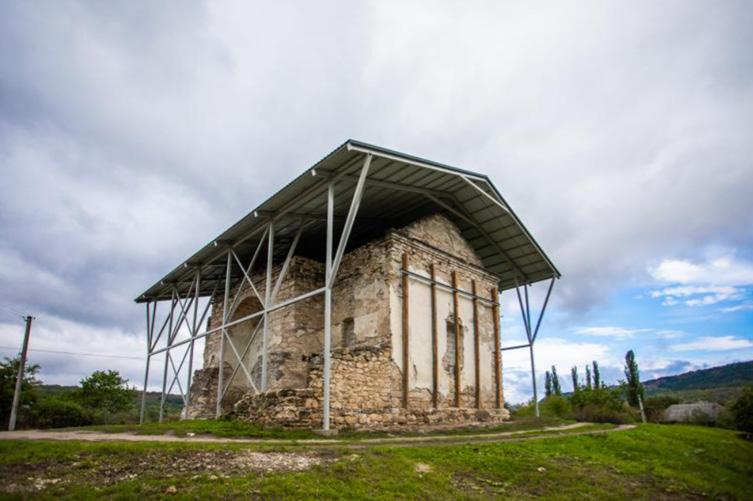
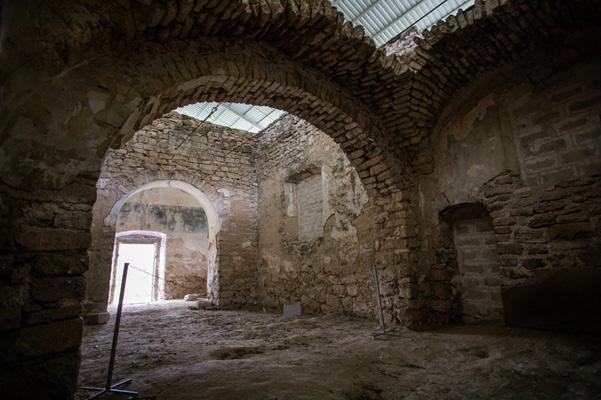
The national legislative framework in the field of animal protection is to be improved through the “Help to our little friends” project implemented by the National Environment Centre between May 2022 and May 2023 with the financial support of the European Union.

In 30 years of independence, no law has been adopted in this regard. In Moldova, there are only local regulations for pets, while the national legislation on the identification and registration of animals refers only to species of cattle, sheep, goats, pigs, equids, donkeys, and their descendants, with the exception of wild animals.
At the same time, people are increasingly worried about the packs of stray dogs they encounter on the streets, the biggest concern being related to the safety of children. Active communication with citizens is imperative to explain to them that this problem is also related to their behaviour and perception
of animals, especially when they choose to have a pet and then abandon it.
The innovative element of the project is the public consultations held in two stages: pre- and post-elaboration of the legislative framework for the protection of stray animals. To begin with, representatives of the local public administration from the three areas of the Republic of Moldova were consulted: North, Centre, and South, who expressed their visions and concerns related to this subject. Among them are the lack of a centralized mechanism for registration and evidence of stray animals, lack of a structure and/or specialized service in this field, allocation of additional financial sources, introduction of penal mechanisms in cases of violence against animals and facilities for responsible owners of pets etc.
In parallel, a wide-ranging public awareness and information campaign is being conducted under the banner “Adopt
a
“Help to our little friends” – an EU-funded project that supports the improvement of legislation in the field of animal protection
friend”, aiming to change the perception and behaviour of the public towards stray animals, encouraging citizens to either adopt or provide aid to animal shelters. The campaign emphasizes the conscious and
responsible adoption and care of the little friends, and all the informational materials are available on the website and Facebook page of the National Environment Centre.
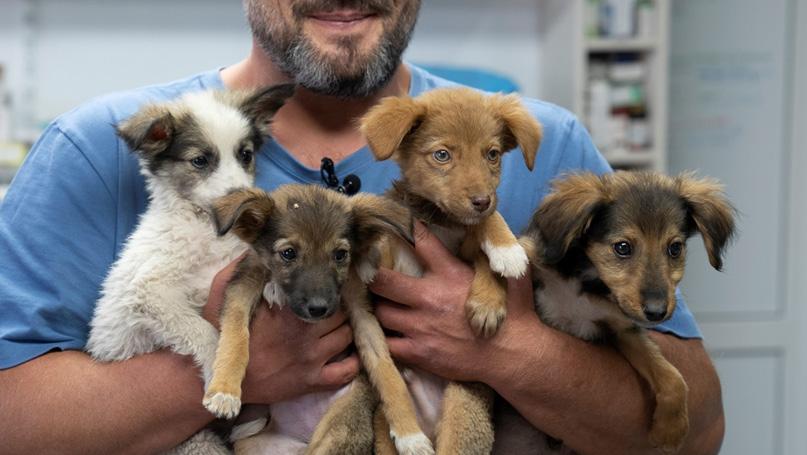
In 2022, Erasmus+, which is the European Union’s programme for education, training, youth and sport, celebrated its 35th anniversary. Since 1987, the Erasmus+ programme has supported the most ambitious and successful projects based

on the free spirit of the European Union. Thus, more than 12 million beneficiaries participated in academic and youth exchanges, in projects for modernization and internationalization of education around the world.
On the occasion of this anniversary and in the context of the European Year of Youth, the Erasmus+ National Office together with the Delegation of the European Union to the Republic of Moldova and the Ministry of Education and Research of the Republic of Moldova organized on October 12 a festive event, which brought together the beneficiaries of the Erasmus+ programme from Moldova: students, youth, academics, but also representatives of ministries and NGOs in the field of youth and education. Thus, the event aimed to become a platform for promoting the Erasmus+ programme in the Republic of Moldova, the voice of
young people, and a networking platform for establishing new partnerships within Erasmus+ projects.
The first part of the anniversary event was held at Clasa Viitorului (State Pedagogical University “Ion Creangă”) and was dedicated to the Erasmus+ projects fair and inspirational talks with the beneficiaries of the Erasmus+ Programme from Moldova (students, young people, academics). The event culminated with an exceptional classical music concert at the Organ Hall performed by Erasmus+ students from the Academy of Music, Theatre and Fine Arts.
Currently, the priorities of the Erasmus+ programme relate to areas such as social inclusion, green and digital transition, promotion of young people’s participation in democratic life. The budget of the programme for the period 2021-2027 has been doubled compared to the previous phase, reaching 26.2 billion euro.

In the Republic of Moldova, Erasmus+ projects have been implemented since 1994 on the dimension of higher education and youth. Starting 2021, a novelty for the Republic of Moldova within the Erasmus+ programme
are the capacity building projects in the field of VET, which have as their main goal the modernization and internationalization of this sphere of education.
Until now, thanks to the support of the Erasmus+ Programme in the Republic of Moldova, the following results have been achieved: 83 Tempus projects, over 6000 academic mobilities and over 8000 mobilities for young people, 21 capacity building projects in higher education and 27 Jean Monnet projects.
Nowadays, the risk of burn-out is considerably high among activists and civil society organisations. Both at the global and local levels, burnout is becoming increasingly prevalent. After 2 years of the COVID-19 pandemic, the war in Ukraine further aggravated the psycho-social condition of civil society actors who are now actively involved in the refugee crisis management. Despite this, the good news is that burnout can be prevented and treated if we take a few steps in our daily working lives.
can be taken both individually and within the organization in order to prevent it. Moreover, the participants underlined once again the importance of organisational well-being for the sustainability and efficiency of the organisation itself.
In this regard, through the European Unionfunded regional project “Civil Society Organisations Capacity Development” in the Republic of Moldova, ERIM (formerly IREX Europe) organised an anti-burnout workshop for 5 NGOs from different parts of the country (Librarian’s Association of Moldova, Public Association “Viața fără Leucemie”, from Chișinău; Public Association “Primăvara care ne unește” ,“Autism Hope” from Bălți, and Public Association “Neemia” from Glodeni).
The workshop was held in an idyllic and peaceful village in the north of Moldova. With the support of the psychologist, the organisations had the opportunity to better understand what is burnout, what are its causes and consequences, and what steps
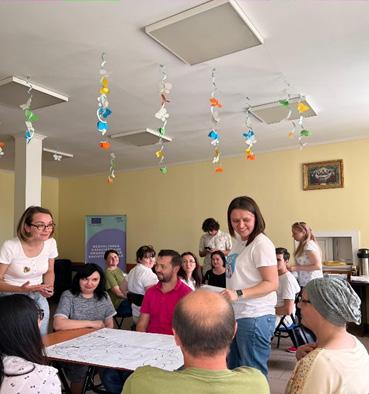
The anti-burnout workshop represents one of the activities aimed at increasing the resilience of 6 civil society organisations that are part of the capacity development programme implemented by ERIM. Based on a thorough needs’ assessment conducted with the support of the psychologist, each organisation established its own antiburnout plan consisting of informative and capacity-building activities as well as individual counselling sessions. The support was further tailored based on the type of beneficiaries each organisation works with. The final aim of this support is to strengthen civil society organisations’ capacities and increase their sustainability by preventing the burnout syndrome among their staff and volunteers.

In May, against the backdrop of the unjustified Russian war of aggression against Ukraine, EUBAM joined the European Commission’s Solidarity Lanes initiative that aims at establishing and supporting alternative logistics routes between the EU and Ukraine. On the one hand, these

routes guarantee the uninterrupted export of Ukrainian agricultural goods through the EU ports to the world market; on the other, they enable the unhindered delivery of humanitarian aid, food, fuel, etc., to all people who urgently need it in Ukraine.
On the Southern flank of the Solidarity lanes, the Republic of Moldova is now a transport hub between grain-rich Ukrainian South and the Romanian ports. To make the passage of Ukrainian cargo through the Republic of Moldova swifter and easier, EUBAM carried out the “Solidarity Lanes” exercise to identify challenges and enhance management of the increased border traffic.
In these regard, on 6th of September, EUBAM team participated in the meeting between the Heads of Ukrainian Chernivtsi Customs and Moldovan Customs House “Nord”. In the same vein, on 7th of September, at Ukrainian Mohyliv-Podilskyi Border Crossing Point (BCP), EUBAM experts facilitated the meeting between the heads of Vinnytsia Customs House and Moldovan Customs
House “Nord”. During those meetings, the Mission’s experts shared EUBAM’s insights and proposed practical solutions to optimise the logistics and tackle overloading at the border. For instance, the Mission’s experts highlighted that passport control formalities should be prioritized for lorry drivers and suggested to better manage traffic before the BCP. EUBAM team also supported an initiative to mandate two additional BCPs for clearance of agricultural goods in the Northern sector of the Moldova-Ukraine border.
Commenting on EUBAM’s role in Solidarity Lanes and the Mission’s perspective on it, the Head of EUBAM, Slawomir Pichor noted, “Although the UN-backed agreements partially reopened three seaports at the shores of the Odesa region for agricultural export, Ukraine’s major land and railway transport corridors remain of vital significance. Especially now, when the new crops are to be harvested and the winter is coming together with increased need in humanitarian assistance, we need to support Solidarity Lanes stronger than ever.”

The 18 young people who carried out their internship in the Presidential Administration received their award certificate during a

festive ceremony which took place on 29th of September.
For three months, 18 interns worked next to the staff of the Presidency - advisers and heads of divisions - in the legal, security, communication, foreign affairs & protocol, internal policy and other departments. According to the concept of the programme, the main goal is to offer the opportunity to students and young graduates to learn what public service work means and to acquire skills that will increase their chances of employment in the future.
Previously, 29 young people, who had their internships within the Governmental institutions, received their award certificates.
In total, the pilot edition of the Internships Programme of the EU included 47 interns assigned to work in more than 15 state institutions.
The interns were selected on the basis of a thorough selection process, which included a pre-selection of CVs, supported by motivation letters and also face-to-face interviews with a Selection Committee, comprising representatives of the Delegation of the European Union, state institutions of the Republic of Moldova, and the EU High Level Advisers. The Internship Programme is fully funded by the European Union.
The initiative was launched in the context of the European Year of Youth 2022 and was designed to encourage the participation of young people in all social, economic and administrative activities.

More than 30 teenagers from Strășeni and Fălești rayons participated on Friday, October 28, 2022, in the awarding event of the winners in the contest of messages promoting gender equality, initiated by Public Association “Institutum Virtutes Civilis” within the “Young men and women
for equality and non-discrimination - phase II” Project, part of the regional program “Together against gender stereotypes and gender-based violence”, funded by the European Union and implemented by UN Women and UNFPA.
Simona Luca, a student from Străseni, is among the winners of the message contest. She impressed the judges with a short video where together with her friends she explains why gender stereotypes are harmful.
“Through this exercise, we actually addressed our peers. Our message is that we are the masters of our own lives. The future we will have, depends on us, so we must not be afraid of our own ideas and desires. We are free to be different”, was Simona’s message.
And Gleb Cebotariov, from Fălești, hopes that through his work, a video promoting gender equality, he will succeed in motivating as many young men and women as possible to think outside of stereotypes and prejudices.
“We understand that it is no longer cool to judge others and have offensive behaviour. We want this message to reach as many people as possible: young people or adults. Change must start with us. It is important to take care of how we act because we are all the same and have equal rights”, believes Gleb.
The Manager of the project “Young men and women for equality and non-discrimination - phase II”, Olesea Vladîca, drew attention to the activities implemented during the last months and aimed at highlighting the stereotypes and prejudices that the society faces, but especially showing to young people the ways they can overcome them.
“We are already implementing the second stage of the youth projects for equality and non-discrimination. During the project
activities, we met young people from four rayons who want to bring a change in their communities, among their peers, namely to promote gender equality between girls and boys through creative activities. At first, they didn’t know how to do this, but through trainings, debates and contests we helped them to change certain opinions and learn about ways to combat stereotypes. We sincerely believe that these young people are the agents of change”, said Olesea Vladîca.

50 pupils from the partner schools of Joboteca Project — 25 schools in 5 rayons — met, between October 26 and 28, in Chișinău, to present their business and social entrepreneurship ideas in the framework of an event conducted by Terre des hommes
Moldova. The pupils have previously participated in an Entrepreneurship School held in August, and have worked, during the following two months, on developing business ideas, under the guidance of mentors.

At the event, the pupils had the opportunity to present their ideas, as if they were in front of potential funders. Their ideas were judged by experts in business and social entrepreneurship from ODA, YEP Moldova, Eco-Ră`zeni, Eco Visio, CEDA and Startup Moldova. The jury members gave feedback to the young people’s ideas and expressed their willingness to support them, if they request it later.
Alexandru Bordea, business consultant, came up with a message for the young people who are at their first entrepreneurship experience. He spoke to them about the most important three skills for an entrepreneur: public speaking, selling skills and leadership
“Don’t give up on today’s ideas, not necessarily for the sake of money, but for experience. Take advantage of your age, now you can test almost any idea and not lose anything. If you have tried a project and it didn’t work, you can start another one tomorrow”, the entrepreneur stated.
Young people opted for business ideas, as well as for social projects. As in a real business idea competition, the three most convincing projects were declared winners and awarded.
Young people opted for business ideas, as well as for social projects. As in a real business idea competition, the three most convincing projects were declared winners and awarded.

1st place: 17 Team, „Fire the ball” Project, „Mihai Eminescu” high school, Căușeni (1000 Euro): the young people will set up, with the help of the pupils from the school and of the community, a sports ground with the necessary equipment for carrying out a wide spectrum of sports activities. The pupils want the sports ground to be a place where connections are built and events are held, becoming a traditional occupation in the community.
2nd place: 5 Plus Team, “Basketball at your place” Project, „Vasile Alecsandri” theoretical high school, Călărași (500 Euro): the pupils intend to set up a basketball court in Tuzara commune, which is 2 km away from the town of Călărași. Young people from both communities will enjoy this area. Sports activities and other local events will also be held in this area.
3rd place: „Iconic” Team, „Musical Saturdays” Project, „Meșterul Manole” high school, village of Sălcuța, Căușeni rayon (500 Euro): this team intends to establish a music club for children from socially disadvantaged families, where they will be taught to play the guitar. On various occasions, paid events will be held to ensure the sustainability of the project.
„At the Entrepreneurship School, as well as during the two following month,s when I was working on the business idea, I gained a lot of knowledge about how a business works. At the same time, I had the opportunity to disseminate the information obtained at the summer school, I set up a team with my colleagues and we thought together how to contribute to the change for the better of the town of Călărași. Now, we enjoy the beautiful results”, says Dorel Râpa, pupil at „Vasile Alecsandri” theoretical high school in Călărași, member of the winning team.
Șargarovschi Anastasia, pupil at „Mihai Eminescu” theoretical high school in Căușeni, is a member of the team that ranked third.
„This experience gave me the opportunity to experience first-hand how difficult it is to become an entrepreneur, but, most important, the participation in these activities has raised my perseverance, motivation and desire to get involved in bringing the change”, she said.
Following this experience, the young people who became winners will proceed with the implementation of the projects, and to the identification of other sources of financing to cover all their costs. The rest of the teams are also encouraged to put their ideas into practice. Terre des hommes will support them, if necessary, alike the members of the jury who expressed their willingness to do it.
The project „JOBOTECA – a pilot programme to prepare young people from Moldova for the labour market” (2021-2024) is implemented by Terre des hommes Romania and Terre des hommes Moldova, in partnership with the Ministry of Education and Research of the Republic of Moldova, and is funded by the European Union.

Ukrainian refugees settled in the north of the country have access to free legal advice and psychosocial support, thanks to the “ACCESS: Provision of multi-sectoral humanitarian assistance to conflict-affected populations in Ukraine and Moldova” project, funded by the European Union and implemented by the non-governmental

organisation People in Need Moldova. Legal advice and psychosocial support services are provided directly by the organisation Legal Clinique Balti (Clinica Juridică Bălți), which has created a mobile team of legal consultants, lawyers and a psychologist, as a result of the grant awarded under the project.
The mobile team provides these services in 13 rayons in the north of the country, both in refugee accommodation centres and in rural localities where refugees found hosts individually.
Every month, on average, 300 refugees receive answers to legal questions or are helped to overcome more difficult psychological conditions caused by fleeing the war and settling temporarily in our country. Most often, Ukrainian refugees have questions concerning how to get new passports, as in the case of many of them the validity of their passports has already
expired after many months in the Republic of Moldova.
Anastasia Russu is a psychologist in the mobile team and works with refugee children, taking care to propose interesting activities and create a safe and comfortable environment for the children. She uses drawing as a working technique, because through drawing children express their emotions and show how much trust they have towards the adults who come to help them. In her discussions with the children, she emphasizes emotions and positive moods, and only if the child alone feels the
Legal
and
from the north of the Republic of Moldova, provided with the support of the European Union
need to talk about the war she gently and thoughtfully begins to broach the subject. and Moldova” has two components. The first refers to the provision of multi-purpose cash assistance to families in the Republic of Moldova hosting refugees, and the second is aimed at the protection sector and includes support activities and workshops for civil society organisations helping refugees, as well as psychosocial and legal support programmes for Ukrainian citizens who have found refuge in our country.
“I have worked with children who lost their fathers in the war, it is very difficult: children have insomnia, often psychological problems arise, so you need to work individually with them to help them. We don’t want these children to have traumas in their adult life, so it’s better to work with them now, so that in the future they feel like ordinary people, without traumas,”
says Anastasia.
The project “ACCESS: Provision of multisectoral humanitarian assistance to conflict-affected populations in Ukraine
This project is running for the sixth year, mainly in Ukraine, and since March 2022 activities have been extended to the Republic of Moldova. The smooth implementation of the project in our country is ensured by a consortium of three international NGOs – People in Need, ACTED and REACH, with People in Need as the lead of implementing group.

Civil society organisations (CSOs) play a key role in providing services, mobilising the community, raising awareness, engaging in policy development and advocating the protection of human rights and civil liberties during and in the post-pandemic period. With this in mind, three international organisations – People in Need (PIN), Netherlands Helsinki Committee (NHC) and AFEW International
(AFEW) – joined efforts and proposed, within the framework of the European Union’s “Eastern Partnership – COVID-19 Solidarity Programme”, to implement a series of interventions in Armenia, Georgia, Republic of Moldova and Ukraine, to help reducing the impact of the pandemic and contributing to the socio-economic resilience of vulnerable groups in the long run.
The project has been carried out in two phases, initially targeting the difficulties of health and social services provision and the increased socio-economic needs, particularly among vulnerable people. At this stage, actions focused on supporting selected CSOs that were severely affected by the COVID-19 pandemic. Subsequently, after identifying the immediate needs of those disproportionately affected by the pandemic, actions focused on the structural barriers that prevented people from exercising their
rights. Thus, the project supported socioeconomic recovery and resilience through advocacy efforts, targeting general reform in the sectors concerned, with a focus on capacity building.
In the Republic of Moldova, within the advocacy component, PIN helped six local CSOs develop the skills and knowledge needed to influence recovery and reform in the long run, while supporting them through direct involvement in the process. In doing so, the organizations were helped develop

European Union Solidarity Programme
comes up with a new intervention to support the activity of civil society organisations in the Republic of Moldova
their capacities using a combination of coaching, mentoring, on-the-job training and workshops as tools to develop and promote CSO advocacy strategies and action plans.
In addition, actions focused on improving CSOs’ skills in areas such as strategic communication, media cooperation, public speaking, lobbying and policy dialogue and fundraising. Meanwhile, as part of the longer-term capacity building process, PIN Moldova provided grants of up to €4,000 to six CSOs for activities that supported advocacy efforts and the development of long-term pandemic resilience policies for vulnerable groups. Both well-established and grass-root organizations received grants for advocacy and capacity building processes, and successfully developed advocacy strategies and action plans.
“Prietena Mea” (My Friend) and Centrul Național de Prevenire a Abuzului față de Copii (the National Centre for Prevention of Child Abuse – CNPAC) are among the six CSOs supported by PIN Moldova with financial resources provided by the European Union within the project.

“Prietena Mea”, being a grass root CSO, outlined in its advocacy strategy the aim to undertake actions to increase awareness and acceptance of children diagnosed with Down syndrome, by guiding and informing parents and raising community awareness. Hence, a part of this long-term goal has laid the ground for an action plan aiming at improving the quality of life for people with Down syndrome at national level by improving the legislative framework on their rights. “Prietena Mea”’s advocacy action plan focused on the development of research on the comparative analysis of best practices, policies and services for children with Down syndrome and their families in Sweden and in the Republic of Moldova, with the aim of identifying potential areas for intervention by public authorities. The results were presented at a conference held in September 2022, attended by parents, representatives of public authorities, partners from Romania, media representatives and civil society stakeholders.
In the context of the capacity building initiatives offered by PIN Moldova, the organization has improved its skills in understanding how to run an advocacy campaign and engage effectively in policy dialogue and lobbying. Furthermore, “Prietena Mea” had a meeting with the Chair of the Parliamentary Committee on Social Protection, Health and Family. In the meeting, the parties discussed the adoption
of operational protocols for medical staff on the communication of diagnosis, the creation of online counselling and information services according to the Swedish model, as well as other related topics. In addition, this project gave the organization the opportunity to have a study visit to Bucharest to learn about the legislation on special kindergarten allowances for parents of children with Down syndrome and to establish partnership
relations with similar organizations in Romania.
The second organisation supported through the project – CNPAC – started piloting, in January 2022 in Chisinau, a new social service for the psychological rehabilitation of children who were victims of violence. In its advocacy strategy, the organization aimed at promoting the adoption of the regulatory framework, which would allow the creation, development and operation of psychological rehabilitation services for children who were victims of violence and for their families throughout the country. CNPAC has also made efforts to strengthen cooperation between local public authorities in order to better identify the needs of target beneficiaries, as well as to raise awareness among professionals, the general public and potential beneficiaries of the need for specialized psychological rehabilitation services for children who were victims of violence and their families. CNPAC’s advocacy action plan focused on raising awareness among the general public, relevant professionals and potential beneficiaries of the need for the Government to formally establish sustainable recovery services to ensure the well-being of children who were victims of violence. This could be achieved
through the adoption of the general legal framework and minimum quality standards for the operation of the service.
With the financial support of the European Union, CNPAC has succeeded in implementing its action plan in terms of developing a visual identity for the new service, relaunching the public appeal and raising awareness of the service among the general public and potential beneficiaries. In addition, CNPAC held a press club in collaboration with the Ministry of Labour and Social Protection. The event brought together representatives of 10 media institutions and aimed at raising public awareness of the psychological rehabilitation service for children. The event took place in the context of the designation of CNPAC as a key actor to support the Ministry of Labour and Social Protection in the development of framework regulations and minimum quality standards for new and existing services.
The project “Eastern Partnership – COVID-19 Solidarity Programme” is being implemented from July 2020 to December 2022 with financial support from the European Union. The aim of this project is to mitigate the adverse effects of COVID-19 and contribute to the long-term socio-economic recovery of vulnerable groups in Eastern Europe.
For 2 years, the project team “Civil society actors as drivers of change in South Caucasus and Moldova”, funded by the European Union and co-funded by the Czech Development Agency, supported the development of 14 newly established civil society organisations. This project provided a learning and development platform for selected civic actors, who were guided by facilitators to assess their capacities and determine strategic development directions over the next 2 years.
The civil society organisations involved in the project were provided with a comprehensive training programme, tailored to their needs and focusing on topical issues such as community engagement in the organisation’s work, strategic communication, team dynamics, fundraising, partnership building, etc. An important component of the project was the provision of grants for both organisational development and local campaigning, which enabled civil society actors to promote their cause and key messages, raise awareness and attract new community supporters.

from the Republic of Moldova
of change for a better life, with the financial support of the European Union and Team Europe
The results of the project “Civil society actors as drivers of change in South Caucasus and Moldova”, implemented by the international NGO People in Need from January 2020 to September 2022, were presented at a final event in Chisinau in September.

The financial support, provided to the 14 civil society organisations involved in the project, helped to improve various sectors such as social inclusion of vulnerable people, mental health, inclusive education for children with autism, non-formal education for young people, good governance, protection of human rights, access to paralegal services for vulnerable people, environmental protection. The total value of the grants awarded is more
than €177,000 and project activities covered 10 regions: Bălți, Cahul, Cantemir, Chișinău, Criuleni, Dubăsari, Hâncești, Ștefan Vodă, Ungheni and TAU Gagauzia.
The regional project “Civil society actors as drivers of change in South Caucasus and Moldova” gave participating organisations from the Republic of Moldova the opportunity to meet other civil society actors from Armenia and Georgia. Thanks to this, the organisations involved in the project communicated freely with teams and civic actors from the Eastern Partnership area and gained new experiences, good practices and inspiration for new activities and collaborations.

Independent journalism has never been more relevant to democracy and protection of human rights as it is now, in the age of fake news and misinformation.
To support this sector in the Republic of Moldova, the Slovak Agency for International Development Cooperation, with the support of European Union, held an event on 26 October 2022 in Chisinau, with the aim to promote an open Call for local media outlets within the project “EU Support for Local Media Outlets in the Republic of Moldova”.
The event took part within the series of Team Europe initiatives.
“It is extremely important to ensure a favourable environment for the mass media, so that citizens have full access to any transparent, impartial, and fair information”, said the Ambassador of the European Union in the Republic of Moldova, Jānis Mažeiks.
“I am proud that the EU decided to show its trust towards the Slovak Agency for International Development Cooperation in the implementation of this very relevant and significant project, which focuses on the transfer of experience and media culture from European countries”, said the Ambassador of the Republic of Slovakia to the Republic of Moldova, Pavol Ivan.
The primary goal of the program is to help local media in Moldova to improve their content creation skills as well as their business development skills. Target beneficiaries are divided into two main groups – local media start-ups (starting initiatives) and relatively well-established local media outlets. Overall, total number of around 20 local media institutions will be selected at the end of November.
(Video) Inauguration of a study class for NEET youth at Penitentiary no. 4 – Cricova | Positive News (stiripozitive.eu)
A study room equipped with computers for the training of convicts was inaugurated in the premises of Penitentiary no. 4 in Cricova.
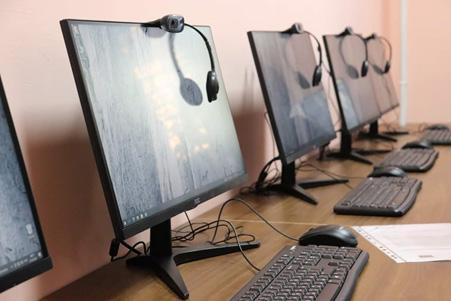
The event took place in the presence of the State Secretary of the Ministry of Justice, Nadejda Burciu, the deputy director of the National Penitentiary Administration (NPA), Liuba Jignea-Suveică and the partners who supported this project, the East European Foundation, DVV International Moldova and “Positive Initiative” Public Association.
In the opening speech, Nadejda Burciu mentioned that the study room will allow the inmates develop digital skills that are essential for integration into the society after
release. “Convicted persons are deprived of their freedom, but not of other rights such as access to education, work. In Moldova, the share of NEET young people is 26%, and the effects of this inactivity have multiple effects such as the lack of a legal source of income, decreased self-confidence, anxiety, depression, feeling of helplessness. Cumulatively, these effects force some young people to resort to risky behaviours, such as abusing alcohol or substances, and in some cases committing a crime. Thus, currently in the penitentiaries of Moldova there are about 2000 young people between the ages of 18 and 29, which is a third of the total number of prisoners.
The Ministry of Justice aims to establish of a progressive system of sentence enforcement, which will entail access to education and community work for those who will serve the sentence in less restrictive regimes”, said the Secretary of State.
The new study classroom is equipped with 9 computers and aims to increase the chances of reintegration of NEET prisoners, who will develop basic digital skills which will allow them to access educational programs in
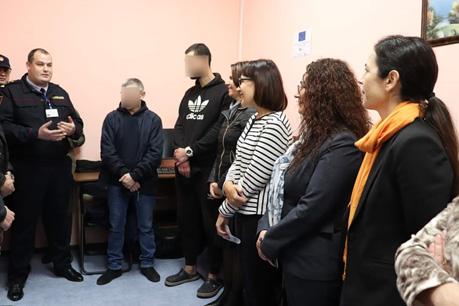
the penitentiary, validate these skills, but also continue their studies at the next levels afterwards.
The classroom equipped with computers was set up with the support of “Positive Initiative” Public Association within the project “Inclusion of NEET young men and women from the most vulnerable categories, namely those in conflict with the law”, financed by the European Union and cofinanced by Sweden.
In the Republic of Moldova, a methodology on calculating the social services costs will be developed and piloted. The document will have a role of a normative act and will be used by the authorities in the process of planning and budgeting social services and their contracting from private or public providers. The development of the methodology was launched with the EU support, by the Public Association “Institutum Virtutes Civilis” in partnership with the Ministry of Labour and Social Protection, which established, for this purpose, through a ministerial decision, a consultative working group. The group, includes representatives of the rayon social assistance and finance departments of different rayon councils, as well as social service providers, and meets regularly in Chisinau to examines the draft methodology that is in the process of development with the support of the experts Mariana Ianachevici and Veronica Sandu.
At the first meeting held on Friday, October 7, 2022, based on the proposal of the experts, the working group accepted a new approach as the basis for the future methodology – the approach centred on the activity provided to the beneficiary of social services and not the approach based on norms.
„We come with a different approach for the calculations on a social service - we start from the activities we provide. So, first of all - we establish exactly the list of services we offer, secondly - we identify the beneficiaries who needs the whole package of activities and those who need only a few of the services, and
thirdly, we determine the average amount per a client who needs 6-7 activities and for the one who needs 1-2 activities”, explains the essence of the approach Mariana Ianachevici, executive director of the “Ave Copiii” Association and one of the experts developing the methodology.
Together with Veronica Sandu, Mariana Ianachevici is convinced that the proposed approach will allow estimate realistically the costs of social services and will, implicitly, lead to the improvement of the quality of services:
“This approach emerges based on reality, it allows us to give an exact estimate, not one based on standards. First of all, it will greatly influence the quality. When a realistic estimate of social services can be calculated, it is much easier and more efficient to find the suitable provider that offers qualitative services. It could also influence the emergence of much better competition, as we have many places in the country where there is absolutely no competition in the provision of social services, and when there is no competition, the quality suffers. But we need quality. I come from the field of child protection and I always say: children deserve something better. To be able to offer them something better, you have to offer quality, but quality is born from competition. That has to be set in the quality standards, and the standards allow you to say exactly what service and how much it costs.”
THE
THE
The
group of the Ministry of
and
Protection started the development of the methodology on calculating the social services costs
At the first meeting of the working group the participants accepted the new approach, finding it suitable for the further development of the methodology.

“It is an exercise that we have been waiting for a long time, so that social services in the Republic of Moldova have a unique calculation methodology accessible to all providers, both state and private. Over the years, we have had several exercises for the cost calculation of social services and I believe that the method that was discussed today is the most useful and applicable”, said Liliana Samcov, representative of the “Demos” Association from Edineț, an organization that provides specialized social services - assisted social housing and socio-professional integration services for children and young people.
The Secretary of State within the Ministry of Labour and Social Protection, Vasile Cușcă, the Chair of the Working Group, announced at the end of the meeting that, once the activity-
based approach is accepted, formulas and other instruments will be developed further in the next meetings discussions.
“My opinion is that we have clarified some aspects and I think that at the next meetings of the working group we will have even greater clarity, we will really have the products that we can approve and use further on. Indeed, we discussed this topic many times and over many years, but unfortunately, we did not find consensus and, perhaps, we did not have continuity in what we did. That’s why we need to complete this exercise and have a working tool that will be useful for all of us, at the local and central level”,
said Vasile Cușcă.
The development of the methodology is part of the project “Civil society organizations acting for better social service”, financed by the European Union, co-financed by the Soros Foundation Moldova and implemented by Keystone Moldova and “Institutum Virtutes Civilis” Association.
Children and adults with disabilities in Balti municipality will have free access to specialized support, offered at home by the Mobile Team Social Service. The Mobile Team consists of five specialists, including a psychologist, a physiotherapist and two speech therapists.
With the European financial support, the service was equipped with a vehicle used by the specialists to reach the beneficiaries’
homes in reasonable time. The service was initially accredited by the National Council of Social Service Providers, being trained to provide care according to quality standards. In total, 60 children and adults from the municipality of Balti will benefit from the services of the Mobile Team. The beneficiaries will be helped to develop skills for an independent life as part of the community.
The service is developed by the “CREDIS” Public Association, in partnership with the Balti Municipal Council and the General Directorate of Health, Social Assistance and Family Protection. The Balti Mobile Team is
„I am here to reaffirm the support of the European Union for the development of the field of social services in the Republic of Moldova. Providing the necessary assistance and social inclusion to all vulnerable categories is a guarantee of a healthy and prosperous society.
one of the 40 social services created within the project “Civil society organizations acting for better social services”, co-financed by the European Union and Soros Moldova Foundation.
That’s why we will continue our efforts to support activities that contribute to improving the quality of life of vulnerable people”, said Victoria Neaga, project manager at the Delegation of the European Union in the Republic of Moldova.

in Bălți with the support of the European Union
The project “Balti Mobile Team - support and social inclusion service for people with disabilities” has a budget of 54,561 euro and is implemented in the period of November 2021 and June 2023, within the project “Civil society organizations acting for better social services”, financed by the European Union, co-financed and implemented by the Soros
Foundation Moldova in partnership with Keystone Moldova and “Institutum Virtutes Civilis” Public Association. Starting January 2023, the service will be taken over and managed by the Balti City Hall, under the coordination of the Balti General Directorate of Health, Social Assistance and Family Protection.
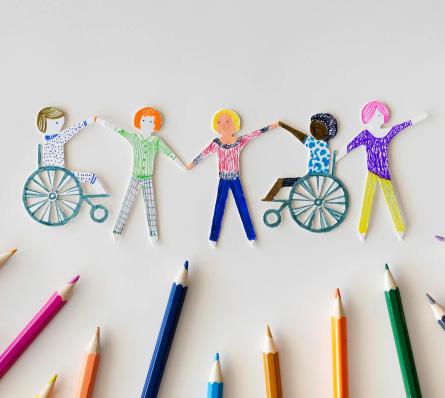

Children with special needs from Cahul rayon villages will be able to more easily attend the Day Centre for children with disabilities thanks to a specially adapted minibus, which was procured by the Centre with the support of the European Union and Soros Moldova Foundation. The minibus was handed over on 19 October, 2022, during the ceremony celebrating 20 years of activity of the Centre in Cahul.
Starting February 2023, the transportation of children with the adapted minibus to the Centre, will be taken over and financed by the Cahul General Directorate of Social Assistance and Family Protection. “Cahul Rayon Council accepted with all openness to be a partner in this project, as our interest is that all children in the Cahul rayon, regardless of social status, disability or ethnicity, have equal chances for a decent life”, said Elena Daud, the vice-president of Cahul rayon.
The Centre’s specialists offer children and parents specialized social and educational services, including physical therapy sessions, speech therapy, psychological and psycho-pedagogical counselling.
“The purchase, with the support of the European Union and the Soros Moldova Foundation, of a means of transport adapted for children with disabilities allows us to expand the services of the Centre and ensure access of 25 children from localities that are far away from the Cahul municipality. Until now, the Centre was attended only by children from the city,” said Svetlana Busuioc, executive director of the “Active Women” Public Association, an organization that implements the “Children’s accessibility to a decent life” project.
“With the support of the European Union, several projects are being implemented in the localities of the Republic of Moldova in the field of developing social services, including those intended for children, as we want to build inclusive communities, where both children and adults can benefit opportunities and chances are age-appropriate and based on beneficiaries’ interests”, said Victoria Neaga, project manager at the Delegation of the European Union in the Republic of Moldova.

The European Union and the Soros Moldova
disabilities in Cahul
Roberta Metsola, the president of the European Parliament, visited the main EU Information Center in the Republic of Moldova. In the Europe Café premises, Roberta Metsola was expected by the Young



European Ambassadors who used the opportunity to address questions related to the EU membership status of the Republic of Moldova, energy security, digital agenda and opportunities for youth.
On this occasion, Roberta Metsola offered interviews to local media outlets.

Legal approximation process in Republic of Moldova cannot be understood as alignment of the normative legal framework only, rights and obligations according to
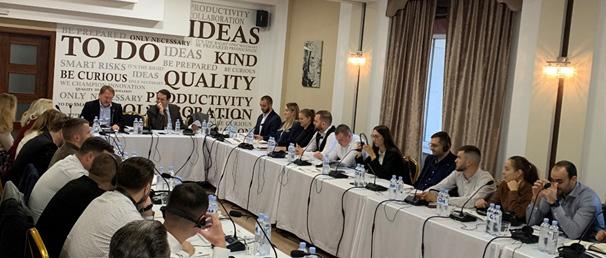
the Association Agreement call also for an efficient implementation, as it is more than obvious that each legal system may be understood as effective only when efficiently implemented.
This specific observation is even more important having in mind that the Republic of Moldova achieved the EU candidate status and the level of legal approximation and especially its implementation will be the subject of the (pre)accession negotiations.
The first important element will be the expected screening process which will have an influential effect on determination of the
related benchmarks, especially in Chapter 8 (Competition and State Aid).
Having in mind the importance of the Competition Law and Policy both with regard to competitiveness of the national economy as well as with regard to the accession process, the EU funded project “Support for structured policy dialogue, coordination of the implementation of the Association
Agreement and enhancement of the legal approximation process in the Republic of Moldova” (hereinafter – Project) planned a series of a specific tailor-made supporting events for the Competition Council of the Republic of Moldova in order to transfer the best practices of competition (antitrust) enforcement from the EU member states.
The last roundtable was on Competition Enforcement manual held on 25 October 2022 and provided a lively discussion on different aspects of implementation process regarding all competition enforcement procedures concerning detecting and evaluation of potential competition infringements as well as the control of concentrations. The manual was drafted considering the stipulations of the current competition legal framework in the Republic of Moldova, as well as best practices of both, the European Commission DG Competition as well as the EU member states, as well as the relevant jurisprudence of the European Court of Justice. Special regard was dedicated to the “Landmark” decisions of the European court of Justice, especially because the Competition Council of the Republic of Moldova shall in the future in their decisions also refer to the decisions of the European Court of justice and/or the European Commission.
If the roundtable regarding the enforcement manual was focused mostly on efficient implementation of the current competition legal framework as well as to prevent from potential procedural mistakes, the special roundtable on the Dawn-raid (unannounced inspections) manual provided the colleagues from the Competition Council the specific instructions for effective unannounced investigations. Detecting of competition infringements is not an easy job and getting access to the documents that are inevitable necessary for the evaluation of potential infringements represents a demanding challenge. The Competition Council has already got experience with unannounced inspections, so the roundtable provided a fruitful discussion of specific challenges, and a special added value represents a
discussion of all relevant challenges and obstacles instead of a potential ex catedra presentation.
Detecting competition infringements represents a specific challenge for all competition enforcers, not just for the Competition Council of Moldova. Obtaining evidence of potential infringements is the most difficult job, nevertheless already the initial assessment of the market failures, therefore potential market distortions represents a specific challenge and that is why market inquiries are of utmost importance not just for Competition Council but for all guardians of public interest.
A competitive market provides all stakeholders a level playing field and the consumers a reasonable price/quality ratio and a choice according to their needs and buying power. A competitive market also depends on efficient use of public funds i.e. transparent and efficient use of public procurement. If in the European Union public procurement expenditure exceed 14% of the total budget, we can get the impression how important it is to be able to estimate the market volume as well as to identify potential shortcomings, failures, and distortions. Economic and structural indicators represent a perfect, however a very demanding tool to get a clear picture of a market situation.
The roundtable on economic and structural indicators that was held on 27 October 2022 provided an extensive overview of indicators how to understand the state of play on the market as well as how to use those indicators to make the economic assessment of the market development, potential distortions and elements that may hamper the market circumstances.
The roundtable was again very dynamic, with a lot of different views on how to identify and use specific indicators, nevertheless it proved to be the perfect tool to upgrade the current knowledge for assessment of market situation, both to regard of competition issues as well as to public procurement issues.
Bid-rigging (collusive tendering) as specifically harmful behaviour was also the subject of special trainings in July and the follow up is planned to take place in December this year in order to elaborate in detail the tools of detecting bid-rigging as well as promoting the fight against it. The specialized trainings in July as well as mentioned roundtables provided an important basis for the planned activities in the future.
The above-mentioned roundtables resulted in an extensive interest of beneficiaries (Competition Council staff) for further assistance by the Project team experts as well as by the acknowledgement that there is a considerable level of expertise that should be upgraded by the project assistance.
The project activities focused on assistance to the Competition Council as well as other related stakeholders represent an excellent added value to the forthcoming accession negotiations and preparation for the screening process as well as for the desirable future technical assistance project.
According to the experience with the extensive cooperation of the Competition Council and substantive discussions on those roundtables it may be concluded that potential technical assistance will provide support higher level of transposition of the EU Acquis, efficient implementation and in the expected process of the accession negotiations a credible support to drafting position papers as well as other activities related thereto.

The third and the final workshop on “Addressing hate speech through improving data collection” for equality bodies from Western Balkans and the Eastern Partnership region took place on 18-19 October 2022, in Strasbourg. As the previous two events on this subject this year (June, July 2022), but

also as per the previous years’ assistance tackling other angles of responding to hate speech, it ensured continuation in presenting antidiscrimination and equality standards, relating good practices and tools for data collection important for combating hate speech but also hate crime.
The event focused on establishing a clear link between collection of relevant data, assessment of collected data and development of adequate policies. Special attention was also devoted to the issue of underreporting and important work and effort of the civil society organisations across Europe in this respect, to collect data and support vulnerable groups and victims of hate speech and hate crime. Also, one of the sessions covered the work of the European Court of Human Rights and main sources of information in the case-law on discrimination and hate speech cases, the relevance of national data and statistics all contributing to standard setting and caselaw development in these areas.
Participants exchanged experiences of their respective institutions in documenting and combating the hate speech and its effects in offline and online environment. With the use of internet, information is shared much faster, offering many opportunities but also posing some risks especially in terms of sharing harmful content. It is important not only to record and classify the cases of hate speech but also to understand the negative impact of such speech to ones that are targeted, mostly vulnerable groups, such as minorities.
Continuous monitoring and analysis of hate speech are crucial for setting the basis for the development of efficient laws and
policies. The monitoring activities should be continuous and used not only to set but also improve existent policies and their impact, to raise awareness of all actors and general public – encouraging education, counter and alternative speech. Interaction between equality bodies, judiciary, civil society organisations and other relevant actors is fundamental for creation of peaceful existence and maintaining of human rights friendly environment.
This series of workshops for equality bodies contributed to making steps forward in combating inequality and hatred using a human rights approach. The regional format of co-operation between equality bodies at the same time enabled a platform for sharing information on applicable European/
international standards, guidelines, examples of good practices but also for discussing challenges and possibilities for improvements through networking and mutual support.
The activity was organised within the action “Promotion of diversity and equality in the Western Balkans” (“Horizontal Facility for the Western Balkans and Turkey 2019 - 2022” programme) and the project “Strengthening access to justice through non-judicial redress mechanisms for victims of discrimination, hate speech and hate crimes in the Eastern Partnership” (“Partnership for Good Governance II 2019-2022” programme), joint initiatives of the European Union and the Council of Europe, implemented by the Council of Europe.
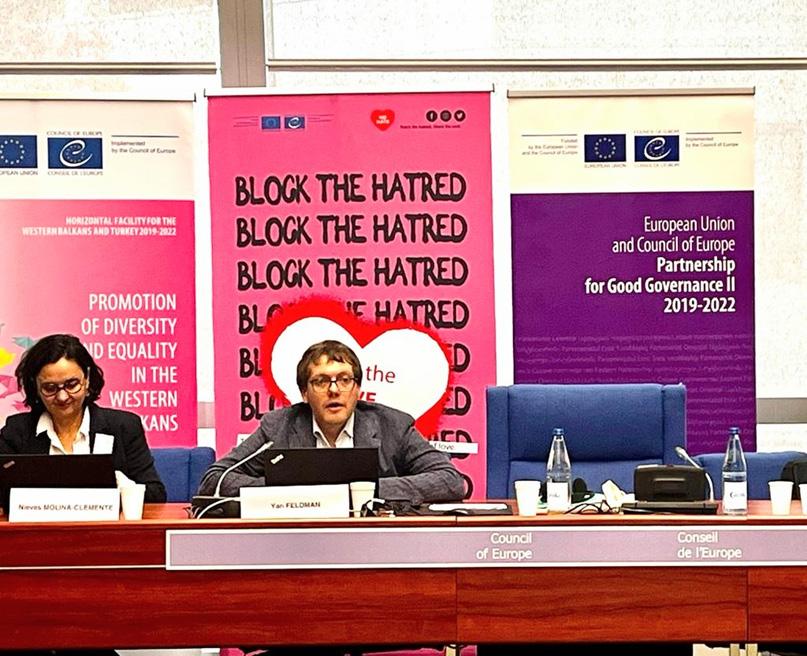
On 28 September 2022, the European Investment Bank (EIB) and the Ministry of Health of Moldova signed a €498,000 grant agreement funded by the EIB-managed EPTATF. These funds will cover the establishment of a project implementation unit in the Ministry of Health to assist it in the preparation of feasibility studies, functional plan, preliminary design and tender documents for the planned construction of the two new regional hospitals in Cahul and Bălți. Swedfund has provided a SEK 10 million (almost €1 million) grant to cover the cost of the feasibility study and design of the Cahul hospital.

The new regional hospital in Cahul will expand the range of medical treatments available locally for more than 120,000 people living in southern Moldova, including treatments
term resilience. In a Team Europe approach, constructing new regional hospitals will increase the quality and efficiency of medical treatments using the latest technology and know-how in the field. The new hospitals will help the public health system to cope with future pandemics and other health challenges better, and will address the needs of the citizens of the Republic of Moldova who live in the regions of the country.”
EIB Vice-President Teresa Czerwińska, who is in charge of EIB operations in Moldova, said:
“The mission statement of the EIB is to improve people’s lives. With the signature of this EPTATF grant, we lay the foundations for constructing the regional hospital in Cahul and thus improving the quality and accessibility of healthcare services for Moldovans. Furthermore, the expansion of healthcare facilities will make the country more resilient to current and future threats and crises, such as the COVID-19 pandemic and the war in Ukraine. The EIB is proud to cooperate with Team Europe and the Government of Moldova in modernising its public healthcare system. Investing in health benefits everyone.”
Jānis Mažeiks, Ambassador of the European Union to the Republic of Moldova, said:
“The European Union provides continuous support to the healthcare system of the Republic of Moldova, contributing to its long-
The EIB and the Council of Europe Development Bank are currently considering co-financing the project for the construction of two hospitals, with the EIB planning to fund the hospital in Cahul, and the CEB the hospital in Bălți. The new hospitals are vital to increasing the Moldovan healthcare system’s capacity to provide high quality, affordable medical care to the public. The EPTATF and Swedfund grants will support the accelerated modernisation and expansion of the public healthcare sector in Moldova, and improve its resilience to major crises such as the COVID-19 pandemic and the war in Ukraine — a shared priority for both the Government of Moldova and Team Europe.
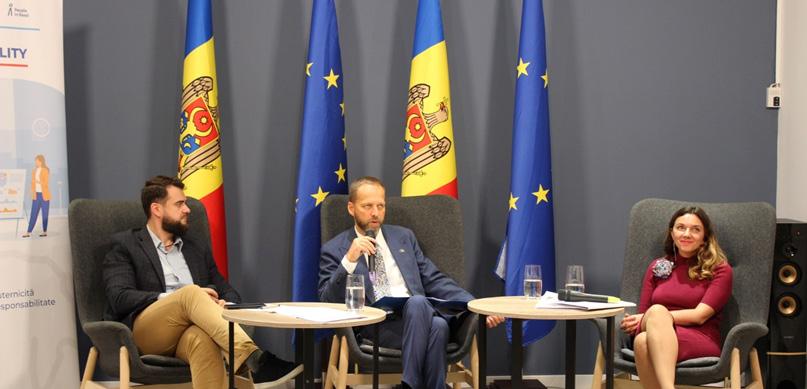
The project EU4Accountability was officially launched on 27 September, 2022, at the Europe Café - European Union Information
Centre in Chisinau - with representatives of the EU, Moldovan local public authorities, and civil society organisations.
Jānis Mažeiks, the Ambassador of the European Union to the Republic of Moldova, stated:
“Today we launch the new EU4Accountability action in 10 rayons across the Republic of Moldova. The European Union is investing 1.5 million euro to strengthen social accountability of the local and central government in Moldova through targeted support to the civil society. This project will offer grants to civil society organisations to support their participation in policy dialogue and monitor the work of public authorities. This project will facilitate the citizens’ engagement in issues that matter to them and empower them to exercise influence beyond voting in elections, which in turn strengthen the democracy in Moldova.”
EU4Accountability aims to support civil society organisations (CSOs) in 10 rayons to influence local authorities through active participation in decision-making to better meet people’s needs. 60 NGOs will learn how to get involved in local budgeting and policy-making, which will then help to better reflect the needs of local communities and increase social accountability. The project is implemented by a consortium of three organisations: the European Partnership for Democracy (EPD), the European Association for Local Democracy (ALDA) and the Czech NGO People in Need (PIN) in the period of 2022-2024 years.
Civil society organisations from Cahul, Cimișlia, Comrat, Falesti, Florești, Glodeni, Rîșcani, Strășeni, Ștefan Vodă and Telenești
rayons, selected through an open call for participation, are currently benefiting from a capacity development programme to learn how to implement their own public policy monitoring project, strengthen mechanisms for social accountability and promotion of best practices, facilitate peerto-peer learning, exchange of experience and networking among local CSOs. The capacity development programmedelivered by the NGOs Caroma Nord, Clinica Juridică din Bălți, Agenția pentru Dezvoltare Regională (AO ADR) “Habitat” and Pro Partenariate - is being implemented in joint sessions with local public authorities (LPAs) to foster a culture of collaboration and LPAs-CSOs alliances for change. The training is structured around organisation capacity development and technical skills to improve social accountability, with sessions on participatory budgeting, good governance, communication with externals, project management and exchanges of collaboration practices.
EU4Accountability promotes the concept of social accountability among citizens, members of civil society and representatives of local public authorities by explaining the

benefits of social accountability in practice. The benefits are visible once civil society better understands its role - to demand the allocation of the local budget to the real needs of citizens, and also to observe whether public services are of good quality and ask for improvements where something is perceived wrong or unfair.
EU4Accountability also foresees offering grants to CSOs in the 10 target rayons of the project to implement social accountability processes at local level. In this way, CSOs will be able to participate more effectively in community planning, as they will be better recognised as legitimate actors to engage in local democratic governance.
In parallel, over the next 18 months, the Moldovan CSO Centrul de Politici și Reforme (CPR Moldova) will conduct a nation-wide and participatory policy dialogue on social accountability mechanisms in order to enhance the policy framework conducive to increased citizens’ participation and responsibility of the public authorities. CPR Moldova will seek to build consensus around a shared assessment of the policy field to overcome the policy gaps.
It is timely for civil and state stakeholders to engage in social accountability as it encompasses several policy fields relevant
for the democratic progress of the country: the integrity of the state institutions, responsiveness to the needs of the
citizens, institutional set up securing public participation, effective social policies, and addressing priorities for local development, to name only a few. This is especially relevant since the Republic of Moldova has been officially granted candidate status to the European Union, and one of the priorities identified by the EU Commission for Moldova’s accession is to enhance the
involvement of civil society in decisionmaking processes at all levels. By bringing together CSOs and public institutions from the whole country to agree on a shared assessment of the policy field, CPR Moldova will consolidate the policy evidence base on social accountability and subsequently enable stakeholders to co-design a Roadmap for Reform to improve the policy framework.

EUBAM organized six training events in September-October for the Moldovan and Ukrainian Border and Customs service colleagues to improve vessel search techniques and better combat firearms and drug trafficking.

Maritime and river transport is the most effective and economical way of transporting large cargo from one place to another. Because of their size, ships are also a great hiding place for contraband. Giurgulesti International Port has 5-6 vessels
coming in from around the world every week. Two EUBAM experts from Poland and Finland shared their knowledge to better prepare for the vessel search: the most efficient search techniques and practical risk analysis because improving those techniques are essential for the safety and security of the Republic of Moldova. But as the experts emphasized, you must use a lot of imagination to discover the hiding places because “smugglers have a lot of time to think about them at sea”.
The fight against drug trafficking is continuous all-around Europe, and the Republic of Moldova is no exception. Criminals are using the country to transit to
the EU, but unfortunately, domestic demand for drugs is growing. To better combat drug trafficking, EUBAM organized four training events in September to introduce
the latest practices from the experts of Germany and Poland. Altogether around half a hundred officers of Moldovan Border Police in Ungheni, Chisinau, Stefan Voda and Edinet learned about the recent case studies, different drugs and their effects, risk profiling, and most common smuggling routes.
Firearms trafficking fuels other types of serious crimes, and criminals use creative ways to hide them when crossing the border.
EUBAM dedicated last week at the Ungheni Border Security Centre of Excellence to combating weapons, ammunition and explosives smuggling training for future

trainers. Participants from Moldovan Border Police and Ukrainian Border Guards learned about the trends in trafficking and how to remain safe while handling them, the importance of international information exchange etc.
Now colleagues from the Republic of Moldova and Ukraine are ready to take the knowledge to their organizations and train others. Trainers from the Polish Border Guard and the Moldovan General Police Inspectorate ensured that the future trainers were armed with all necessary skills to cascade the learned knowledge to their colleagues.
An informal network of development partners active in the anticorruption field was kicked off on Friday, at the initiative of the Delegation of the European Union to the Republic of Moldova. The main aim of the network is to provide a communication platform for all the donors active in the field of anticorruption for regular interaction, identification of synergies and coordination of efforts. The first informal meeting was held on Friday, 23 September, chaired by Irina Cruceru, Programme Manager for Good Governance and Public Administration Reform, Anticorruption and Anti-money
laundering at the Delegation of the European Union, and Pawel Wojtunik, EU High Level Adviser on Anticorruption.
Representatives of major development partners which are currently running projects on anticorruption in Moldova, including Embassies of France, Romania, Sweden, the United Kingdom, the USA, as well as UNDP, USAID, GIZ took part in the meeting.
Participants listed the ongoing initiatives in the field of anticorruption, as well as plans for the next period, identifying potential cooperation opportunities and making sure to avoid overlapping of efforts.
Participants agreed to meet on a regular basis and continue communication.
The Network remains open to all development partners who are planning to develop programmes and projects on anticorruption in the Republic of Moldova.
The meeting was organised with the support of the EU-funded project “EU High Level Advisers’ Mission”.

A new Communication Strategy of the Customs Service, accompanied by an action plan, was presented to the general public on October 11. The strategy was developed with the support of the European Union, through its project “EU High Level Advisers’ Mission”, having as a main objective to establish a clear framework for both internal and external interaction, but also to identify the right channels and instruments in this regard.
At the Strategy launching event, the Director of the Customs Service, Igor Talmazan, emphasized the important role of communication for the Customs authority,
with the subsequent aim of facilitating trade, creating a favourable climate for business, and ensuring transparency in the conducted activities.
In his turn, Vasile Plămădeala, Trade Officer within the Delegation of the European Union to the Republic of Moldova, mentioned the stable partnership enjoyed by the Republic of Moldova and the European Union, based on the Association Agreement, the EU being the main trade partner of the country. Prompt, open communication from the Customs authority is essential in facilitating trade, and the EU has been continuously supporting efforts to modernise the institution.
Among other objectives of the Customs Service Communication Strategy, the following can be listed: development and implementation of internal and external communication channels; development and implementation of a two-way information flow, highlighting the role of the Customs Service and communicating the results of its activity in a user-friendly and understandable manner; building the trust in the Customs
Service as an entity aiming to provide highquality, professional, reliable and impartial public services, fulfilling its mission efficiently and empathetically in regard to stakeholders.
The event was attended by representatives of the business environment, producers’ associations, public authorities and the media.

The Customs Service is strengthening its communication efforts, with the support of the European Union
The gaps related to the public office in the Moldovan civil service have been analysed and prioritized within an exercise conducted by the EU High Level Adviser on Local Public Administration Reform, including Decentralization and Voluntary Amalgamation, Victor Giosan, together with representatives of the State Chancellery involved in the process of public administration reform.

The aim of the exercise was to come up with the most relevant deficiencies related to the public office in the context of the development of the new public administration reform strategy.
Among the issues revealed within the exercise, the following can be mentioned:
• Lack of a centralized and strengthened public office management unit within the State Chancellery;
• A limited capacity of the Human Resources Units within the public administration;
• A payroll and benefits system that fails to discourage the staff turnover;
• An underfunded professional development system that lacks training courses;
• Lack of an operational information system for public office management.
This activity is part of a round of three sessions; the other two exercises envisage the analysis and prioritization of gaps related to the public institutions and the strategic planning system and reduction of bureaucracy; and digital public service
development as well as local public administration, being scheduled for the nearest future. The exercises are held in the context of the development of the new public administration reform strategy, expected to be finalized by the end of the year.
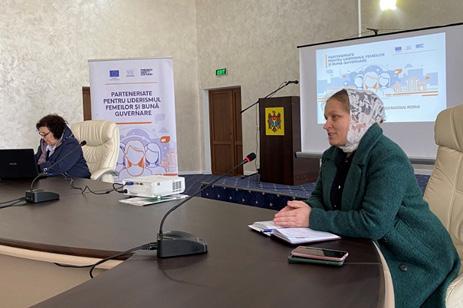

The experts of the “Partnerships for Women’s Leadership and Good Governance” Project presented, during October 2022, the audit reports on local policies on gender equality for Ialoveni, Rezina, Telenești and Străseni rayons. The documents produced by independent experts in public policies include recommendations regarding the integration of gender dimension into public policies and institutional procedures of local public authorities (LPAs).
gender integration in the public policies implemented in Ialoveni, Rezina, Telenești and Străseni rayons. One of the conclusions is that, at the rayon management level, there is understanding, support and openness to ensure gender equality. There is also a collaboration on gender equality dimension at the stage of drafting public policy projects. Despite these conclusions, several vulnerabilities were identified that can generate risks for the activity of the local public administration.
Among others, the experts found that the gender units – the institutional framework for ensuring the gender dimension, remain non-functional. Also, the internal informative framework for regulating the LPAs activity partially reflects the provision of the gender dimension.
The authors of reports analysed dozens of internal acts, public documents
The report launched discussions among the officials from the rayon councils of Ialoveni, Telenești, Străseni and Rezina. In the opinion of Victoria Marian-Bogoș, Vice-president of Ialoveni rayon, the document faithfully
“We have a law that, in practical terms, should guarantee gender balance. Unfortunately, it works only on paper. The general perception in society is that the woman’s place is in the kitchen, educate children, or be a secretary and not as one to accomplish major issues. We are trying to change the perception at the level of society, but we still have a lot of work to do”, was the conclusion of the Vice-president of Ialoveni rayon. The vice-president of the Rezina rayon, Aurelia Grigorita, appreciated the implementation of gender audit in the rayon, giving assurances that the formulated recommendations will be applied in practice.
Inga Iovu, Coordinator of the “Partnerships for women’s leadership and good governance” Project, pointed out that honest debates on the reports are extremely necessary. And this is because Action Plans will be drafted to guide the rayon administrations in the future development of policy documents to reflect the specific interests and needs of all the inhabitants of the community: women, men, elderly people, children, people with disabilities, etc.
At rayon and local level, working groups were created. They will directly conduct gender audits and Action Plans to ensure gender equality in the communities of Străseni, Rezina, Telenești and Ialoveni rayons. To facilitate the process, the working group will be provided with a practical guide listing with the steps to follow in the audit process.

The EU-funded Project „Support the Moldovan Government in Identifying and Preparing Projects Linked to the Implementation of the Association Agreement (PPF)” Technical Assistance team expanded its reach at the regional level of the Republic of Moldova. The Project experts delivered the Costing of Public Investment Projects training in Nisporeni municipality on 14-16 September 2022.
The participants from Nisporeni Municipality and Rayon Council were provided with both theoretical and practical training sessions aimed to enhance their ability to calculate the costs for capital investment projects.

The course was structured in 6 modules: Cost classifications, terms and concepts, Marginal and absorption costing, Standard costing, Variance analysis, Relevant costs for decision making and Costing for capital project.
Project experts Irina Grigoryan and Eugenia Busmachiu who delivered the training received positive feedback from the participants at the end of the training.
Projects, with the support of a EU
From 21st of September to 23rd of September 2022, a part of employees from the Nisporeni Municipality and Rayon Council participated in the Financial Analysis and Risk Assessment training course delivered by the
EU-funded Project Support the Moldovan Government in Identifying and Preparing Projects Linked to the Implementation of the Association Agreement (hereinafter - PPF) Technical Assistance team.

The training course aimed to strengthen the capacities of the local public authorities by familiarising them with the modern tools and methods for performing financial analysis and risk assessment of projects. Over the course of three days the participants were also involved in practical exercises to enhance their practical understanding of the subject matter.
The course was structured in 6 modules: Cash flow analysis and performance metrics, Applications of cash flow analysis to bond and stock valuation, Capital structure and financial ratio analysis, Capital asset pricing model and cost of capital, Introduction to risk modelling and Risk classification and risk mitigation.
The training course was delivered by the PPF project experts Constantinos Kyriakopoulos and Daniela Cotorobai.
On October 27, 2022, Agency for Land Relations and Cadastre (ALRC) of the Republic of Moldova in collaboration with the EU Twinning project ”Improving spatial data services in the Republic of Moldova following EU standards” financed by the European Union, project partners from Croatia, Poland and the Netherlands, as well as the public institutions that are part of national spatial data infrastructure (NSDI) in the Republic of Moldova, jointly organized an international conference, in order to promote the basic principles of NSDI, the use of spatial data
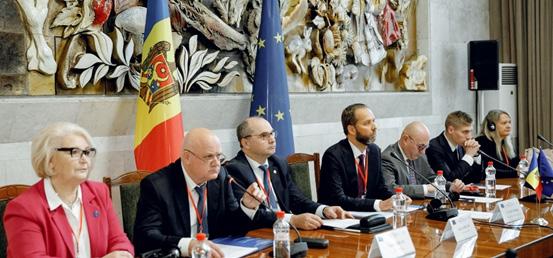
and associated network services from the first source, in order to avoid duplication of spatial data within the state institutions working with them.
The event gathered representatives of institutions and organisations involved in NSDI implementation, central and local public authorities, development partners, representatives of the academic environment, national and international experts, and it served as a platform for discussions and sharing experience.
The implementation of national spatial data infrastructure in accordance with EU INSPIRE Directive foresees the development of a durable geospatial society, based on cooperation among the authorities, by ensuring technical aspects for the interoperability of spatial data sets and network services, and principles governing the access to data through the Geoportal.
At the same time, Geospatial Infrastructure is a functional instrument for the citizens and decision-making factors while checking the information about ownerships, infrastructures and environmental issues in any specific area of the country, improvement of planning capacities within a large spectrum of policies, and, namely, transport, environment, agriculture, forestry, natural resources exploitation, land organisation or land use, tourism and others.”
“Standardised, interoperable spatial data will help the Moldovan Government to efficiently aid citizens, support businesses and improve innovation. The European Union provides support for the implementation of the INSPIRE directive, which enables public institutions to publish their data sets in a way that is accessible and useful to all. This will guide Moldovan institutions to find better solutions to the existing global challenges, but also to improve the cooperation between them. I am convinced that our joint efforts will facilitate the authorities’ engagement in finding innovative solutions for the sustainable development of the country.”
stated Jānis Mažeiks, Ambassador of the European Union to the Republic of Moldova.
As a result of the need to organize the process of sharing and updating spatial data, establishing responsibilities for these data and efficient administration of this field, in the year 2014 the Agency for Land Relations and Cadastre of the Republic of Moldova initiated the process of implementing NSDI, by partially transposing the INSPIRE
provisions, with the support of the EU Delegation. Currently, the legal framework in the field is complete and updated, and the NSDI implementation process involves about 20 public institutions from the Republic of Moldova, as well as third parties sharing data among themselves.
During the event, the participants addressed subjects connected to improvement of processes and implementation of changes in the fields they manage, in parallel with the usage of spatial data, and namely: the use of geographical information systems in the management of road infrastructure, NSDI importance for official statistics, the use of spatial data within the state forestry fund, the use of spatial data at UNGHENI City Hall, applications for the use of spatial data by local public administration - Orhei City Hall, and the use of spatial data in university teaching courses, etc.

At the same time, the event ensured a space for the interaction and experience sharing with foreign partners from Croatia and Poland, who presented their own experience on NSDI implementation and the evolution of open spatial data.
Agency for Land Relations and Cadastre (ALRC) of the Republic of Moldova is the main beneficiary of the EU Twinning project “Improving Spatial Data Services in the Republic of Moldova following EU
standards”. Project specific objective is to enhance e-Government through improved spatial data sharing and cooperation among authorities in line with EU standards and best international practices.
The warm months of September and October 2022 year brought along plenty of events and activities, as well as nice results, within the EU Twinning project “Improving spatial data services in the Republic of Moldova following EU standards”, financed by the EU and implemented by the Agency for Land Relations and Cadastre (ALRC) of the Republic of Moldova in partnership with the counterpart organisations from Croatia, Poland and the Netherlands. The following activities are worth highlighting:
• The business model for ALRC’s e-services and data was subsequently addressed. From the variety of options proposed by the project, ALRC follows to select the most appropriate business model, compatible with the existing legal framework and bearing in mind the peculiarities of working with spatial data and network services,
• Online tools for working with spatial data were explored and presented, their spectrum ranging from simple visualization applications to sophisticated interactive tools. The most relevant examples include: geoportals (as basic source of spatial data), calculators for determining the solar energy potential on roofs, viewer of maps in different periods, dashboards, etc.,
• Practical work at the pilot project commenced with a view to test the six Guidelines that were previously developed within the project. The first training session focused on the application into practice of the Guidelines for analogue to digital conversion of topographic plans for Ungheni city (Ungheni City Hall) and forestry maps (S.E. Institute for Forestry Research and Development ICAS) for Ungheni rayon. Further on, the second session tackled the Guidelines on ”Developing data models” for other spatial
data types, such as: settlements – territorial administrative units (Agency for Public Services, Department for Cadastre), roads (S.E. State Roads Administration ASD) and soil areas (S.E. State Planning Institute for Land Management IPOT). Colleagues from other institutions also joined the training sessions from the pilot project –State Hydro-meteorological Service, S.E. INGEOCAD and General Inspectorate for Emergency Situations, who practiced on their data. The pilot project will continue with the application of other Guidelines into practice.
• Two study visits have been organised to Croatia and Poland, with the participation of officials from ALRC, S.E. INGEOCAD, S.E. IPOT, Agency for Public Services, Department for Cadastre, S.E. ICAS, S.E. ASD, Prime Minister’s Office and Ungheni City Hall. In Croatia, the Moldovan colleagues had the chance to learn the best practices and work and collaboration experiences at the following institutions: State Geodetic Administration, Paying Agency for Agriculture, Fisheries and Rural Development, Zagreb City Hall, Faculty of Geodesy from Zagreb University and Cadastral office from Zadar. In Poland, the participants had working sessions at the Head Office for Geodesy and Cartography, Main Inspectorate for environmental monitoring, Ministry of Agriculture and Warsaw City Hall. Both host institutions presented their geoportals, examples and practical solutions for network services, vector and raster data, use of spatial data infrastructure in territorial development plans and spatial planning, the methodology for data acquisition and verification, as well as implemented projects, financed from European structural funds.
“Improving spatial data services in the Republic of Moldova following the EU standards”
The Twinning project ”Improving spatial data services in the Republic of Moldova following EU standards” is financed by the European Union and implemented by the consortium led by Croatian State Geodetic Administration, as lead partner on behalf of EU Member States, with the support
of Polish Head Office for Geodesy and Cartography and Dutch Enterprise Agency from the Netherlands as Junior MS partners, while the Croatian Central Finance and Contracting Agency provides support in the administrative and financial management.
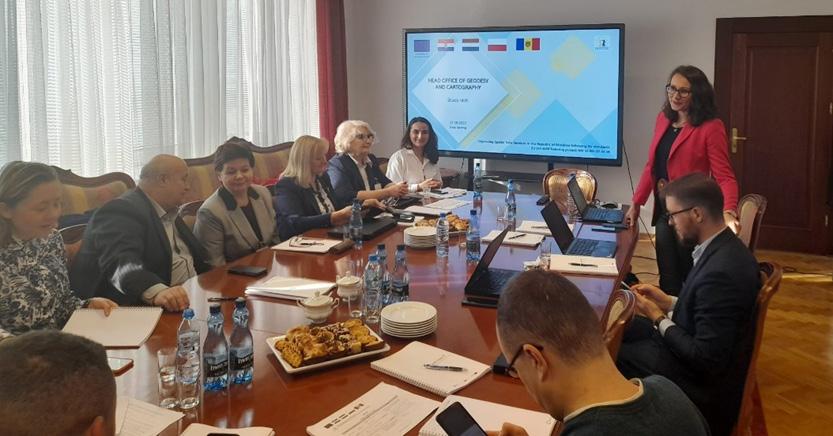


A training course on theory and practice of permaculture was organised by the Republican Centre Gutta-Club in the
framework the EU Confidence Building Measures Programme, implemented by UNDP Moldova.
The location that hosted the course was not random – the Hagimus monastery, Căușeni rayon.
“People don’t analyse and observe the land/ garden they take care of. They want results as quickly as possible, and this is the first and worst mistake. The key principle in permaculture is observation – before you want to get anything from a piece of land, first you have to observe only, that’s all. It is not up to humans to change the system according to which the laws of nature function, instead they should adjust their needs so that they get what they want,” explains the trainer George Sobol.
Another common mistake is that some people start planting in large patches. The recommendation is to start small-scale, and once the expected result is achieved, to expand.
Elena Mărgineanu, PhD student and lecturer in environmental law, was one of the participants in the permaculture design course. She is working on a permaculture project for her thesis. She planted in a circular shape all the fruit tree species growing in the Republic of Moldova on seven hectares of land in Anenii Noi.
“This is something unique. I started from the earliest fruit-bearing trees all the way to the latest. I have also planted regular trees to maintain shade over the plants that need it. I
want to get the healthiest possible yields and this is exactly what I learned in the course: how to make sure that the humidity is preserved, with the minimum use of water.”
Alexandr Gușenco, artist and sculptor, attended the course as well. He first discovered the concept of permanent culture in Ukraine.
“I have lived in Ukraine for a long time, then returned to Moldova, to the left bank of the Nistru river. We need to pass on this knowledge to other people, to popularise permaculture, so that they know how to use natural resources, how to limit the use of chemical fertilisers, which affect the soil’s composition.”

The location that hosted the course was not random – the Hagimus monastery, Căușeni rayon. The nuns who work in the monastery household were also impressed with the earned knowledge.
“After this course I think we will set up a pit for compost and another for animal waste so we can use it on the farmland. I learned many interesting things, such as solar energy, and we are already thinking about harnessing it,” says Mother Evsevia.

Permaculture is a way of designing communities based on mimicking natural ecosystems so that natural resources are
not depleted, the environment is not polluted and the farming system is sustainable with minimal human intervention.
This permaculture course is part of overall European Union’s efforts to encourage the increase of quality standards of agriculture products and the capacity of local farmers to grow organic fruits and vegetables.

According to the 2020 Report on the Status of Organic Agriculture and Industry in Moldova, developed by EkoConnect, due to its good soils, 63% of Moldova’s land cover is used for cropping and that’s the highest ratio in Europe.
The excessive use of synthetic fertilisers and chemical pesticides, permanent monocultures, as well as the lack of crop rotation leads to a reduced biodiversity and level of organic matter in the soil.
To strengthen the resilience of the sector and to make it less vulnerable to the new climate conditions and to improve its productivity, it is essential to enrich the organic matter in the soil and biodiversity through climatesmart agriculture.
Children and young people from Soroca have a proper area to attend trainings and personal development courses, offered by the social enterprise ARA, which was recently launched by the “ANIMA” NGO. This is the second social enterprise launched within the East Europe Foundation’s project “Local civil society contributes to sustainable and inclusive economic development of the country”, financed by the European Union and co-financed by Sweden.
ARA Centre in Soroca provides training services for pre-schoolers and vocational guidance for young people.

“We are launching an innovative model to involve young mothers and empower them economically, but at the same time offer a space for personal development and a nonformal, creative, ingenious education for children and young people. This space will accommodate children of 5 to 7 years old for preschool activities, but we will also hold courses, workshops, training for young people and for teenagers”, says Nona Mihalcean, executive director of “ANIMA” Public Association.
The grant amount for this project is 35.000 EUR and it is offered by the European Union and Sweden. Children and young people from socially vulnerable families will attend trainings, workshops and other activities offered at the Centre for free.
“According to the statute, the social enterprise foresees involvement and rehabilitation of young unemployed mothers. Moreover, we work with children and socially vulnerable young people who would like to participate in such trainings, but could not afford it financially. The centre offers 80 percent chargeable services and 20 percent free of charge for those who cannot afford to pay for it”, says Nona Mihalcean.
Parents from Soroca welcome the opening of the new centre. “The fact that the centre is opened for various groups of people is very welcomed. Especially if we are talking about offering support that is needed for women that were recently on maternity leave”, underlines Aurica Durnea.
Fifteen CSOs received grants through East Europe Foundation on behalf of European Union to launch social enterprises which will create job opportunities. Over 800 persons will benefit from free services and products.
On October 21, 2022, the European Commission together with the European Investment Bank (EIB) launched a prefeasibility study to assess how to better connect the Moldovan and Ukrainian railway networks with the Trans-European Transport Network (TEN-T). The rail gauge used in most of the EU is different to the one in Eastern

Europe, which makes it difficult to ship goods in both directions. This could be solved by extending the EU railway gauge across the borders from Poland and Romania into Ukraine and Moldova. Pre-feasibility study is a key step in preparing for better EU–Ukraine and Moldova connectivity after the war.
European
said:
The study is one of the medium- to longterm measures set out in the Solidarity Lanes action plan and is also closely linked to the Commission’s July 2022 proposal on the extension of the TEN-T to Ukraine
and Moldova. This way we are setting the scene for longer-term solutions, supporting Ukraine in its post-war trade and the reconstruction of the country, aiming, in particular, to remove the interoperability gap at borders”.
EIB Vice-President Teresa Czerwińska, who is responsible for operations in Ukraine and Moldova, said
EIB study on integration of Ukrainian and Moldovan railway networks with the EU is the first step towards a modern transport link between the EU, Moldova and Ukraine. It is a strategic investment for sustainable, green economic growth, which also improves global food security. Integration of railroad networks will allow for easier and safer movement of people, goods and services between the three markets, and faster integration of the two countries with the EU. Finally, with the Russia’s invasion
of Ukraine and the blockade of Ukrainian ports, which induced a global food crisis of unprecedented scale, these new transport links will create a reliable alternative for food supply which will benefit the whole world. All this makes the EIB study on integration of EU, Moldovan and Ukraine railroad networks the right step in the right time. I am very proud of the fact that the EIB and Team Europe continue to contribute to solutions which make the world a better and safer place.”
The EIB technical advisory service JASPERS is in charge of completing the study by May 2023, in close cooperation with all countries concerned.

The spouses Irina and Aurel Carauș from Negurenii Vechi village, Ungheni rayon, are passionate about agriculture and in love with living in the countryside. In 2008, they have planted an apple orchard, investing their money, time and energy. In 2021, through a
grant offered by the European Union, they bought a modern fruit harvesting platform, that represents another step towards the fulfilment of their dream: to have a modern, super-intensive and fruitful orchard.
The company of Carauș family is one of the 12 beneficiaries of the grant offered by “Movila Măgura” Local Action Group (LAG) from the European funds of the “EU4Moldova: Focal regions Programme”. In 2021, Movila Măgura LAG received assistance in the amount of €50,000 which, in its turn, is invested in development projects of the community that are members of the group.
He bought the lands that belonged once to his gran-grandfather and planted an apple orchard

Aurel and Irina were born in the village, then they tried to find their purpose outside their hometown, but finally they came back.
Aurel has worked for 15 years in Moscow, where he started as a loader and became an engineer. Irina is a lawyer by background, and she worked for many years at Ungheni Tribunal. Then they decide to settle in Aurel’s native village
Supported by the European Union, the spouses Carauș from Negurenii Vechi village are developing their business in agriculture
“I wanted to spend the rest of my life in nature, to create something. With my wife, we decided to settle in the countryside, invest and leave something behind ourselves, and we started to cultivate apples,” says Aurel.
And this is how in 2008 the spouses Carauș became farmers. They planted the apple
orchard which covers 18 hectares on the lands which have belonged in the past to Aurel’s grand-grandfather.
“The orchard is located in Caraușeni area (the locals name the area after the ex-owner) and it returned to Carauș family again. So, we are restoring Carauș domains,” the spouses explain, proudly.
They have undertaken the risks of a business, especially in agriculture and they have learned from books, from their own experience and from that of other professionals and finally they have a modern orchard. One can see the results of their work each autumn, when they harvest the fruits. “There were years when we collected even 62 tons of apples. If you take good
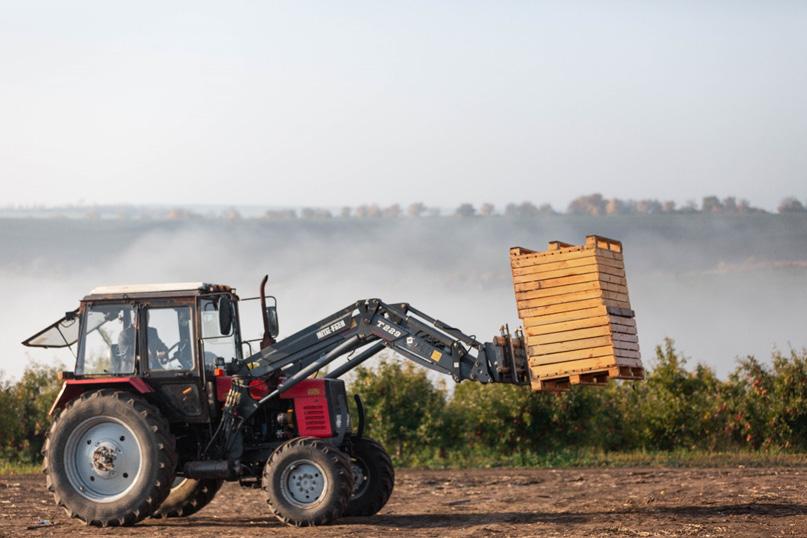
care of the orchard, it gives a good harvest,” Irina tells us.
The apples from Negurenii Vechi are sold on the local market. Carauș spouses have concluded several contracts with companies that buy their merchandise. In 2021, thanks to the grant offered by the European Union, Irina and Aurel bought a harvesting platform
“Before we used to work with a ladder, every worker leaned it to the tree, climbed on it and harvested the apples. Nevertheless, the highquality apples were high above and they had to shake the tree, apples were falling down and their quality automatically decreased,” tells Aurel.
With the purchased platform, the work productivity increases, the apples are being harvested in a qualitative way and on two rows at a time. From five to eight people may climb on the platform and they harvest the apples from the middle and upper part of the tree.
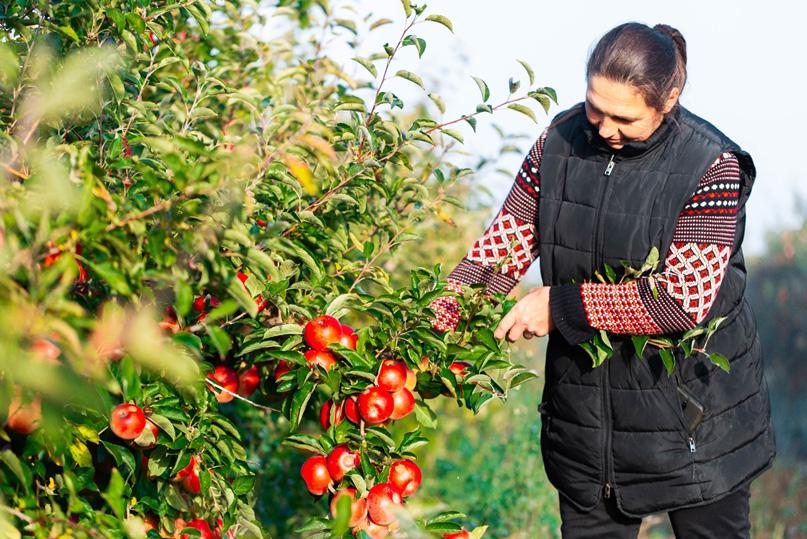
Starting last fall, the spouses Carauș have been using the harvesting platform and this high-performance equipment perfectly fits with their view about modern agriculture. Carauș family has already a high-performance irrigation system, they use drip irrigation and equipment that automated their work in the orchard. This way, together with their younger son, manage to take care of the orchard the year around and they employ day workers only in the harvesting season.
There are no holidays in agriculture
Irina and Aurel are hard-working and ambitious, they don’t complain and work starting early in the mornings.
“There are no holidays in agriculture, the work may not be left aside, there are moments when today is too early and tomorrow it might be late,” admits Irina. This is why it sometimes they work more than 12 hours a day. After 14 years of having chosen agriculture, they don’t regret anything, moreover, they have big plans for development. “No risk, no fun, we invested all the money we’ve had, but it was worthwhile,” Aurel adds.
Besides the apple orchard, Carauș family has lands where they have sown wheat, corn, and sunflower, they grow poultry, have a pond and soon intend to open a guesthouse for all those who are fond of nature and rural life. But until then the spouses Carauș continue to work to fulfil their objectives.
Four Local Action Groups in the regions of Cahul and Ungheni have benefited from grants in the amount of €50,000 each, offered with the financial support of the European Union. The Local Action Groups (LAG) “Lunca Prutului de Jos”, “Cișmeaua Sudului”, “Valea Halmagei” and “Movila Măgura” were selected during a call for grants launched in 2020 by the “EU4Moldova: Focal regions” Programme. 47 development micro projects being carried out in the rural communities of both focal regions. Initiatives to promote sustainable rural tourism, to provide kindergartens with smart equipment, to renovate the parks and public transport waiting stations to facilitate community mobility; support for the existing businesses – provision with modern equipment of the furniture-making factories, bakeries, beekeeping enterprises
or dairy products enterprises – are launched in the villages of Cahul and Ungheni regions with the financial support of the European Union. The new projects will create at least 30 new jobs in the 4 LAGs.
The “EU4Moldova: Focal regions” programme: supports intelligent, inclusive, and sustainable social economic development in the regions of Cahul and Ungheni to ensure to the citizens a better quality of life. The Programme (2019-2024), with a total budget of €23 million, is funded by the European Union and implemented by the United Nations Development Programme (UNDP) and by the United Nations Children’s Fund (UNICEF). More details about the Programme activities in the regions of Cahul and Ungheni may be found at www. eu4cahul.md and www.eu4ungheni.md


On 29 September 2022, the European Union Border Assistance Mission to Moldova and Ukraine (EUBAM) and the Customs Service of the Republic of Moldova, organized the “International Trade Facilitation Forum –Response to the Blockade of Transport Corridors from Ukraine”. The event took place in a hybrid format in Chisinau with the participation of high-level representatives
from the Republic of Moldova and Ukraine, the European Commission, the EU Delegation to Moldova, EU High Level Advisors’ Mission to Moldova, the EU Advisory Mission to Ukraine, Customs Eastern and South-Eastern Land Border Expert Team, and the Customs Authorities of neighbouring EU Member States.
The one-day Forum in Chisinau was opened by Jānis Mažeiks, EU Ambassador to the Republic of Moldova, who emphasized the devastating global impact that Russia’s unprovoked and unjustified military aggression against Ukraine is having: “Russia is deliberately destroying Ukraine’s agricultural and transport infrastructure and equipment, causing fuel shortages,
and creating worldwide food supply chain problems. Russia has in fact endangered food security for millions of people across the world. To address these unprecedented challenges, the EU, together with its EU member states, Ukraine and the Republic of Moldova set up the EU Solidarity lanes. These joint achievements are a testimony of our solidarity. They also reflect our
unicity, our determination to act jointly in support of Ukraine, of its people, but also for the people around the world in needs of these agricultural products”.
The Deputy Head of State Customs Service of Ukraine, Vladyslav Suvorov, thanked all present for the round of applause for all the Ukrainians who, both on the economic and actual frontlines, stand up to the Russian war of aggression. Turning to the forum’s participants, Mr. Suvorov stated, “The war changed the lives of Ukrainian citizens and institutions, and its consequences went way beyond the geographical borders of Ukraine. Because of the Ukrainian sea ports’ blockade, International Automobile Border Crossing Points came under pressure they had never experienced before. However, thanks to the good and close cooperation we established together with Polish, Romanian, Slovak, Hungarian, and Moldovan Customs, and border authorities, we were able to pass this test. Due to this very cooperation, we were able to handle
the migration crisis at the very beginning of the war, at the same time enabling timely delivery of much-needed humanitarian aid into Ukraine. In this regard, I would like to thank the European Commission for the establishment of the Solidarity Lanes initiative, and on the part of the State Customs Service of Ukraine, we put our every effort to enable swift clearance and admission of cargo traffic.”
The Director of the Customs Service of the Republic of Moldova, Igor Talmazan, emphasized the importance of cooperation:
„Today’s event once again demonstrates the fruitful cooperation with customs administrations and other authorities from neighbouring states to identify the optimal solutions for facilitating trade, streamlining cross-border traffic, as well as supporting the strategic partnership between the Republic of Moldova and the European Union.”
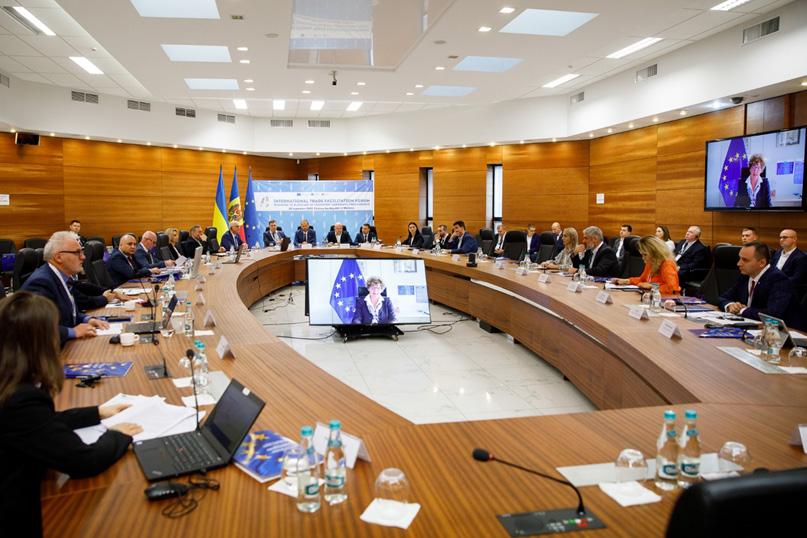
Mr Talmazan stressed that only by unifying our efforts, being anchored in implementing the above-mentioned measures and actions, we would succeed in further unblocking the transport corridors in Ukraine.

Ukraine’s road and railway transport corridors remain vital, even though the UN-backed agreements partially reopened Odesa, Chornomorsk and Pivdennyi seaports for agricultural export, noted the Head of EUBAM, Slawomir Pichor.
“EUBAM keeps working together with our partner services for the simplification of customs and border formalities and supporting Solidarity Lanes stronger than ever. The Mission continues to play the role of a catalyst and bring together services to identify bottlenecks and subsequently find solutions to streamline the cargo clearance. We will also continue our support to Moldovan and Ukrainian partners, especially through training, advice and advocacy for the joint control, as an effective way to speed up cargo movement across borders.”,
Head of EUBAM concluded.
Authorised economic operators from Moldova will now be recognised by all the 27 EU member states – further deepening the economic integration between our country and the Union. This is an important step aimed to boost export capacity of Moldovan products to the EU market and of vital interest to businesses. The adoption of this decision
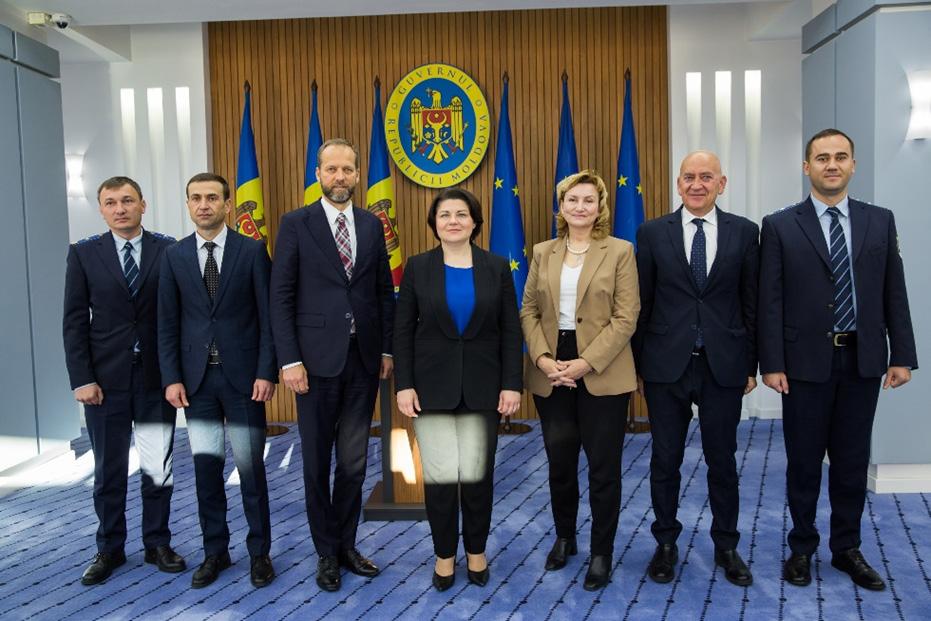
is a historic event, which brings the Republic of Moldova even closer to the European Union, our country now being among the few states with which the Union has such a partnership. The EU mutually recognises the authorised economic operators of only a few more states: the USA, the UK, Norway, Switzerland, Japan and China.
The necessary measures for the adoption of the European Council decision in this regard were possible with the support of the European Union, through the European Union High Level Advisers’ Mission. These included the evaluation of national customs legislation and its approximation with that of the European Union, EU validation missions in Moldova, Romania and Germany, but also the development of a dedicated IT platform
- a complex data exchange system for the mutual recognition of AEOs, being the first connection system between the customs authorities of the Republic of Moldova and the EU member states. The mutual recognition of AEO status will allow certain benefits to its holders, first of all priority treatment while crossing the border – a special lane dedicated to them, and a reduced number of controls.
The Republic of Moldova becomes the first country in the region to achieve mutual recognition of authorised economic operators with the European Union
At the launching conference, the Prime Minister of the Republic of Moldova, Natalia Gavrilita, stated:
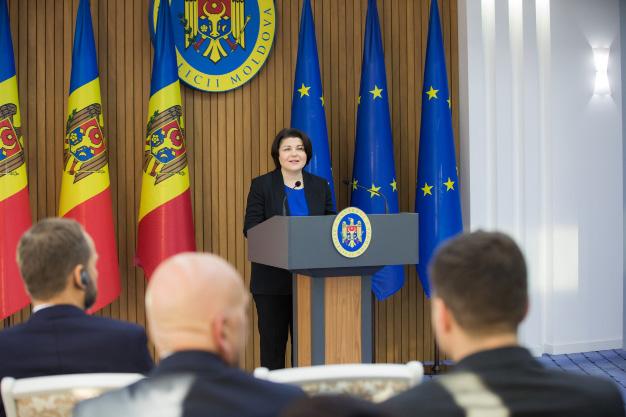
“I am proud that we are the first country in the region to obtain mutual recognition of authorized economic operators with the European Union. It is a status that has so far been achieved by much more developed countries, such as the United States of America, the United Kingdom, Norway, Switzerland or Japan. This result represents a strong signal of confidence for the Government I lead, but also for the commitments we have made in the field of fight against corruption. I hope, in this way, to increase the export capacity of Moldovan products on the European Union market - a desire that is even more important in the context of the difficult economic situation in the region.”
In his turn, the Ambassador of the European Union to the Republic of Moldova, Jānis Mažeiks, emphasised:
“Moldovan Authorised Economic Operators will benefit of the same privileges at the border as the EU’s Authorised Economic Operators. This will mean simplified procedures for customs clearance, less time spent at the border and less queues at the border. Moldova is the first country from EU’s neighbourhood with whom the EU concluded such type of agreement and among the very few countries worldwide that have such an agreement with the EU.”
The implementation of the programme started on 1st of November 2022.

On 5 October 2022, the “EU4Moldova: Local Communities” programme was officially launched. Jānis Mažeiks, the Ambassador of the European Union to the Republic of Moldova, together with Ambassadors of
EU Member States, representatives of the International Development Cooperation, as well as representatives of the Government, have welcomed the launch of the new TEAM EUROPE initiative.
The event was also attended by representatives of the seven in-line ministries, civil society partner organisations, as well as representatives of the Rayon Councils and City Halls of Edinet, Leova and Straseni. The event has marked the beginning of a new strong partnership in building a sustainable future for Moldova.
Following the priorities of the Government of the Republic of Moldova and its citizens, the “EU4Moldova: Local Communities” programme aims to improve the quality of life and address the economic and social consequences of COVID-19 in local communities in rural areas. To achieve this ambitious goal, the programme will focus on:
1. improving the quality of local public service delivery within the selected local communities
2. enhancing the access of men and women to social, economic and technical infrastructure and associated services
3. creating business and job opportunities for men and women
4. enhancing community-led local development.
The activities will mainly focus on Leova, Edinet and Straseni rayons. The programme is a Team Europe initiative, jointly-financed and implemented by the European Union, Germany, Austria and Poland.
In his welcome speech, Jānis MAŽEIKS, the Ambassador of the European Union to the Republic of Moldova stated:
The “EU4Moldova: Local Communities” programme is important to us in the wider EU-Moldova cooperation for a number of reasons. Firstly, it focuses on the development of rural areas, improving living conditions and enhancing the quality of life across the country – creating equal opportunities for all and leaving no one behind. Secondly, this is a TEAM EUROPE Initiative. This includes not only pooling significant financial resources, but also each partner bringing in its specific expertise, technologies and best-country practices, as well as aligning approaches to help Moldova in advancing in its new EU candidacy role.”
With a total budget of 27.4 million euros, the programme is set to achieve its goals until December 2025. The programme is implemented by a wide range of Government institutions, business sector as well as Civil Society partners. The State Chancellery of the Republi c of Moldova is its main political partner.
The “EU4Moldova: Local Communities” programme is financed by the European Union, the German Federal Ministry for Economic Cooperation and Development (BMZ), the Austrian Development Cooperation (ADC) and the Ministry of Foreign Affairs of the Republic of Poland –Polish aid; and jointly implemented by the German Development Cooperation through GIZ, the Austrian Development Agency (ADA) and the Solidarity Fund PL (SFPL) in Moldova.

On October 6-7, 2022, over 400 local and international guests participated in the 2nd edition of the EU-Moldova LEADER Conference, which created a platform for networking and exchange of experience on rural development challenges and community development. The event brought together Moldovan and EU institutions and organizations interested in sharing the LEADER experience, including the European Commission, central authorities of the
Republic of Moldova, European LEADER networks, as well as representatives of Local Action Groups (LAGs) from Moldova and Europe. Guests from Romania, Ukraine, Poland, Estonia, Latvia, Lithuania, Hungary, Greece, France, Germany, North Macedonia, Georgia and Armenia joined the event, bringing a broader European perspective on rural development and exchanging best practices and ideas on ways to enhance community development.
As of June 2022, the LEADER approach in Moldova has evolved into a national LEADER Program, administered by the Ministry of Agriculture and Food Industry, thus positioning the Republic of Moldova as the first and, currently, the only non-EU country to implement the LEADER approach
as an instrument of public policies for rural development. In this context, the event promoted LEADER as a successful tool for rural development and strengthened the relations between the European Union (EU) and the Republic of Moldova on its path towards EU integration.
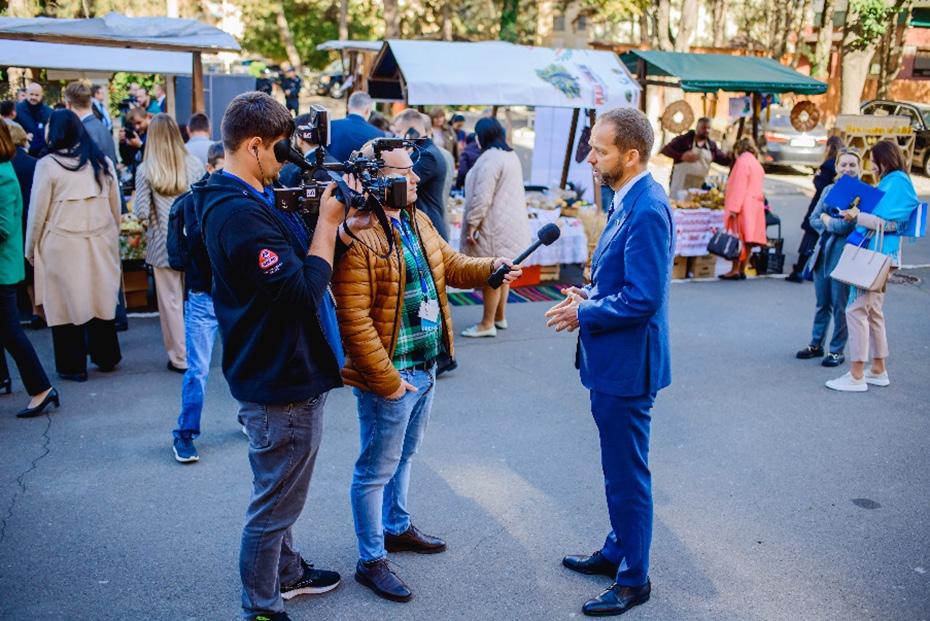
“One of the key priorities of the EU is working with local communities to deliver tangible benefits for the people. With 30 years of experience in the EU, the LEADER approach is recognized as a powerful tool of community mobilisation and empowerment for sustainable rural development. We believe the institutionalisation of the LEADER approach in Moldova is a key milestone on the country’s European journey,”

highlighted Lawrence Meredith, Director for Neighbourhood East and Institution Building in DG NEAR, European Commission.
During the event, participants engaged in thematic workshops moderated by Moldovan LAGs and their partners,
addressing issues related to innovations, rural tourism, youth involvement in rural areas, social entrepreneurship, and future perspectives of rural development. At the same time, the event also offered a space for interaction and exchange of experience with international partners from Romania, Ukraine, Georgia, Armenia, Estonia, Poland, North Macedonia, and Latvia, who moderated thematic workshops on topics related to the establishment of the EaPEU LEADER platform and the cooperation of LAGs, digitization, smart village and the monetization of cultural products, family farm and rural development, and the creation of an eco-museum. The workshops enabled Moldovan LAGs to touch base on rural development challenges with their counterparts and identify solutions for development processes at the local level.
During the Conference, over 45 Moldovan LAGs participated in an open-air fair, promoting rural tourism and traditions and encouraging guests to support local entrepreneurs and buy locally-made products. At the same time, on the 2nd day of the Conference, international guests and partners visited Movila Măgura, Lunca Bâcului and Colinele Tigheciuliui LAGs, where they got acquainted with community development projects implemented at the local level and witnessed first-hand the activity of Moldovan LAGs.
The 2nd edition of the EU-Moldova LEADER Conference was organized by Solidarity Fund PL in Moldova, in partnership with the
Ministry of Agriculture and Food Industry and the National LEADER Network, within the “EU4Moldova: Local Communities” programme, financed by the European Union, the German Federal Ministry for Economic Cooperation and Development (BMZ), the Austrian Development Cooperation (ADC) and the Ministry of Foreign Affairs of the Republic of Poland – Polish Aid; and jointly implemented by the German Development Cooperation through GIZ, the Austrian Development Agency (ADA) and the Solidarity Fund PL (SFPL) in Moldova. The content of this article belongs to the authors and does not necessarily reflect the vision of the above-mentioned partners.

EU4Moldova: Start-up City Cahul launched the first Tourism Accelerator in Moldova. 15 guesthouse and hotel owners from Cahul will participate in a three-month programme. During the accelerator, mentors and experts from the tourism sector will train and guide the beneficiaries to digitize their tourism services, develop an improvement strategy and create a common tourism platform for the Cahul region.
The official opening of the programme took place on September 7, during which 15 owners of hotels and guesthouses who passed the selection stage, mentors, organizers and partners of the programme met in Cahul and discussed the format of the sessions and outlined common objectives for the training process.
In the countries where tourism contributes greatly to economic development, the deployment of tourism accelerators is a common practice. In the Republic of Moldova, the Tourism Accelerator for the Cahul region is the first of its kind and will contribute to the development of the region.

In the field of tourism, there is a need for innovative solutions that can contribute to overcoming the difficulties in the sector and increasing the regional potential, thus attracting tourists, both local and foreign.
The accelerator includes the educational component, specialized consultancy
for identifying the unique offers of each participant, marketing expertise, assistance in SMM and content creation, as well as a series of workshops where participants will deepen their skills in the digital space.
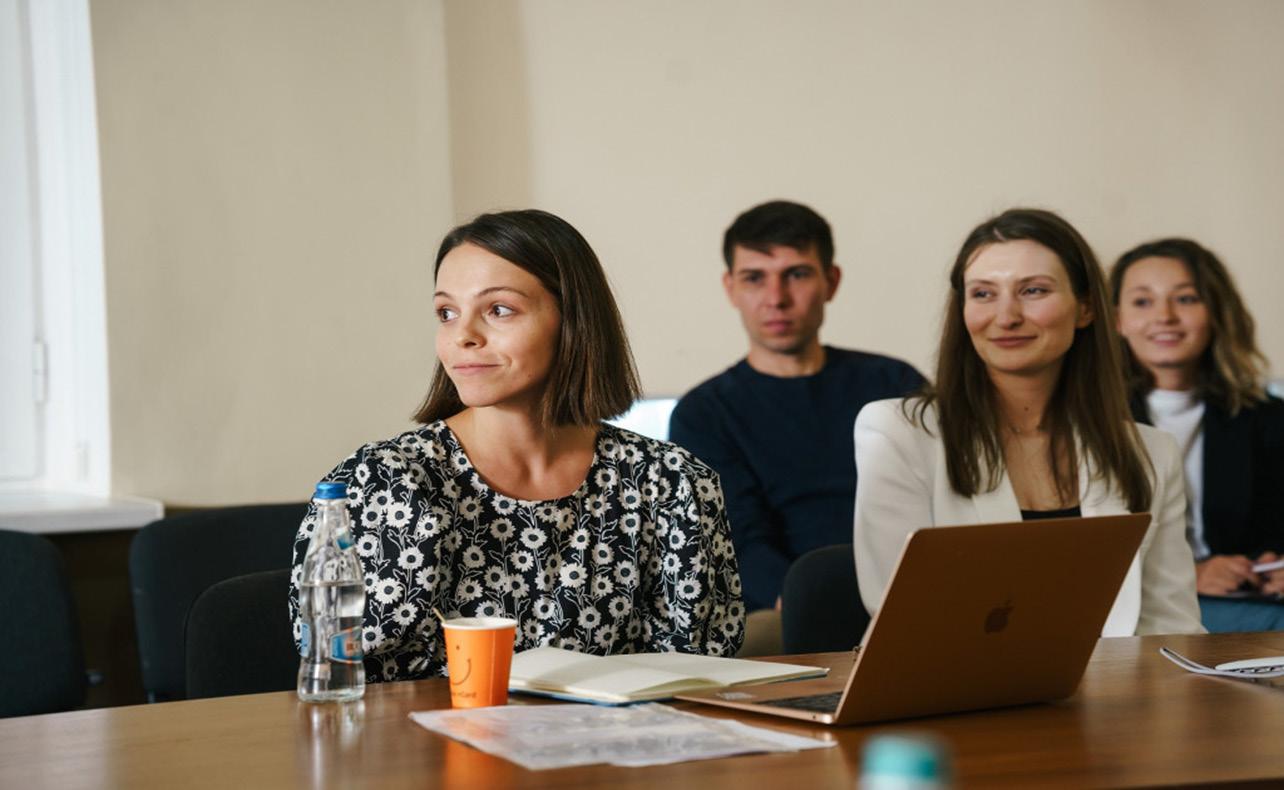
The common task of the participants is to create a concept for the event organized annually in the Cahul region, intended to attract tourists and increase the visibility of the region in the country.
The XY Partners and Teleportravel plan to train 15 guesthouse and hotel owners in the Tourism Accelerator programme, from September 7 to December 15, 2022.
The programme will culminate with an official event to present the results.
EU4Moldova: Start-up City Cahul, a project implemented by ATIC with the financial assistance of the EU and in partnership with the Embassy of Sweden, supports, in particular, economic development through innovation, entrepreneurship, employment in small and medium-sized enterprises outside the capital and offers study opportunities for young people, women and girls in science, technology, engineering and mathematics (STEM).
The EU Twinning Project “Further support to Agriculture, Rural Development and Food Safety in the Republic of Moldova” continues its assistance to the Ministry of Agriculture and Food Industry (MAFI) and Agency for Payments and Interventions in

Agriculture (AIPA) through missions on Data Management and Institutional Development in line with EU standards for a paying agency. Short-Term Experts from Austria and Poland fruitfully engaged in constant exchange of information and transfer of good practices.
rural development information is efficiently collected, of high quality, reliable, and accessible to the relevant stakeholders, the Twinning Project continued the discussions with relevant MAFI and National Bureau of Statistics (NBOS) staff. The concept of introducing the Data Management System connecting Information in the field of statistical data necessary for MAFI has been presented. Likewise, the experts are constantly updating the Data Management Manual which will be handed over to the beneficiaries during the final mission.
The team of Polish and Austrian experts started the second accreditation audit in AIPA. The focus for this time is internal
audit and control activities. The Experts are compiling all their findings and recommendations in a Audit Report, and constantly engaging with the AIPA staff through meetings and presentations. Thus, this efficiently contributes to the insitutional development in line with EU standards. The implementation of recommendations is constantly tracked and support in reviewing AIPA’s procedure and policies is provided as needed.
The Twinning Project is approaching its closing since it is set to finilise its activities in December 2022. The Beneficiary Insitutions report tanglible results achieved with the support of the RTA and short-term experts.
The Edinet citizens will benefit from drinking water in their households, and the public institutions from Straseni and Leova raions will be connected to the sewer system. This is possible due to EU4Moldova: Local Communities programme, a Team Europe initiative, in which one of the Components is to improve local public infrastructure development.

To achieve the goals of Component 2 of the project „Public Infrastructure Development”, the Austrian Development Agency (ADA) organized kick-off workshop meetings in September and October. These included site visits of the most important facilities in the area, such as the Edinet (old) water
treatment plant, reservoirs, and water pumping stations, and identification of the location for the new Water Treatment Plant. The objectives and required actions for the efficient and sustainable construction of the new Water Treatment Plant in Edinet (supplying Edinet and Cupcini towns) were discussed and agreed between key representatives of both local authorities and international partners. Moreover, the stakeholders reached an agreement on the design concept (production capacity) of the new Water Treatment Plant and the most important measures for emergency works for the water transmission system.
EU4Moldova: Local Communities programme will support Edineț, Leova and Strășeni raions to develop their public infrastructure
Likewise, the ADA team organized workshop meetings on improving the existing public infrastructure of sanitation and waste management with the mayors of the villages from Leova and Straseni rayons (6 villages). During these meetings, the action plan and respective commitments assumed by the partners were discussed.
The “EU4Moldova: Local Communities” programme is financed by the European
Union, the German Federal Ministry for Economic Cooperation and Development (BMZ), the Austrian Development Cooperation (ADC), and the Ministry of Foreign Affairs of the Republic of Poland –Polish Aid; and jointly implemented by the German Development Cooperation through GIZ, the Austrian Development Agency (ADA) and the Solidarity Fund PL (SFPL) in Moldova.


The Theoretical Lyceum “Ion Vatamanu” in Strășeni municipality benefited from energy efficiency measures, implemented with the financial support of the European Union. Thus, lyceum students will enjoy more comfortable educational environment, and teachers and auxiliary staff - better working conditions. The measures were implemented as part of the project “Construction of water
supply and sewage infrastructure, as well as energy efficiency in public buildings”, financed by the European Union (EU).
The total value of the energy efficiency works conducted in the “Ion Vatamanu” High School in Strășeni is worth around 1.3 million Euro, out of which 1.2 million Euro were offered by the EU as a grant, and 100.000 Euro – as a

„Ion Vatamanu”
from Strășeni municipality becomes energy efficient with the financial support of the European Union
Representatives of the Parliament of the Republic of Moldova, Ministry of Infrastructure and Regional Development, EU Delegation to the Republic of Moldova, German Embassy in the Republic of Moldova, Central Regional Development Agency, Agency of International Cooperation of Germany (GIZ Moldova), local public authorities, teachers and employees of the “Ion Vatamanu” high school, students and their parents, as well as other residents of the municipality of Strășeni participated at the inauguration event of the energy efficiency measures implemented.
“Thanks to the financial support of the European Union, 650 students and teachers will benefit from energy efficiency measures such as clean energy from solar panels and improved insulation of the building. This will significantly reduce the gas bills for the local authorities and improve the quality of life for the citizens. We are proud to inaugurate today the completion of refurbishment at the Theoretical High School “Ion Vatamanu” in Strășeni. Energy efficiency is now more important than ever and we are proud to step up our efforts to mitigate the impact of the energy crisis. The European Union has supported the green transition in the Republic of Moldova for a long time to increase energy security and to reduce greenhouse gas emissions, in line with the European Green Deal.”
stated Jānis Mažeiks, the Ambassador of the European Union to the Republic of Moldova.
The project also included capacity building and energy management measures supported by the German Government. These measures will certainly create a much better environment for the development and growth of pupils’ generations”, said Margret Uebber, the Ambassador of the Federal Republic of Germany to the Republic of Moldova.
„Despite all the crises we face, the Government will continue to invest in the educational system, so that we get as close as possible to our goal - to ensure a modern educational system, accessible to every student, offering relevant subjects and possibilities for continuous development for each child. Schools and kindergartens are eligible for the “European Village” National Programme, launched this year. So far, 106 projects on capital repair works or modernisation of some educational institutions have been approved. To finance these projects, 388.74 million MDL were allocated from the National Fund for Regional and Local Development for the years 2022-2023. This means that thousands of children and teachers part of these educational institutions will be able to enjoy better studying conditions”, declared Natalia Gavrilița, the Prime Minister of the Republic of Moldova.
“The project on energy efficiency improvement of the Theoretical Lyceum „Ion Vatamanu” in Strășeni municipality represents the close and effective cooperation between the EU, Germany and Moldova, together with the local regional development structures.
The energy efficiency works of the “Ion Vatamanu” Lyceum in Strășeni municipality included: i) the renovation of the roof and the insulation of the external walls of the building; ii) rehabilitation of the thermal plant and external heating networks; iii) installation of the photovoltaic system for the production of electricity; iv) installations of the systems of piped hot water provision and renovation of the institution’s indoor sanitary blocks.
Representatives of the Parliament of the Republic of Moldova, Ministry of Infrastructure and Regional Development, EU Delegation to the Republic of Moldova, German Embassy in the Republic of Moldova, Central Regional Development Agency, Agency of International Cooperation
of Germany (GIZ Moldova), local public authorities, teachers and employees of the “Ion Vatamanu” high school, students and their parents, as well as other residents of the municipality of Strășeni participated at the inauguration event of the energy efficiency measures implemented.
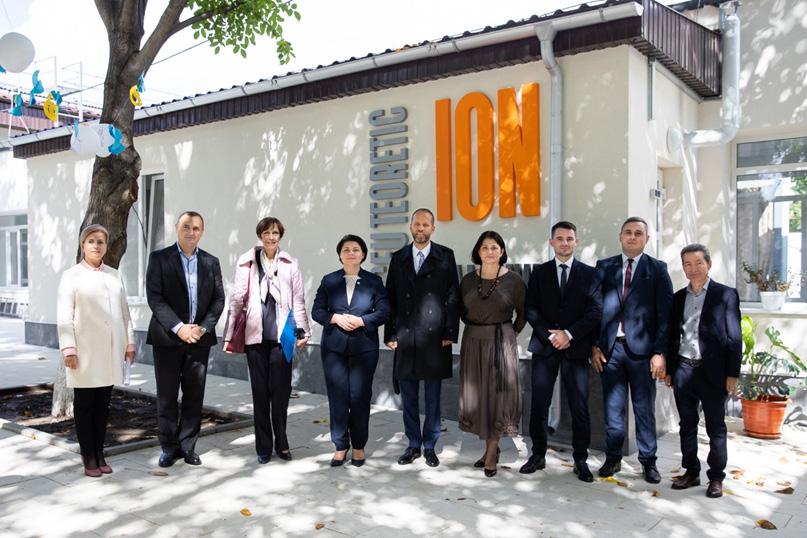

Lyceum ‘Holercani’ from Holercani village, Dubăsari raion, has benefited from energy efficiency measures, carried out with the financial support of the European Union (EU). As a result, the students of the lyceum, school teachers and staff enjoy improved education conditions and comfortable teaching environment. The inauguration event of the renovated lyceum took place in the context of the European Sustainable Energy Week 2022 and the European Climate Diplomacy Week.
Thanks to the energy efficiency measures implemented with the support of the European Union, the annual normalised energy consumption in the ‚Holercani’ Lyceum has been reduced by 58 MWh and the annual normalised CO2 emissions have been reduced by 18 tonnes.
“Ensuring energy security is a government priority. Investing in the energy efficiency of public buildings, homes and businesses will help us lower the cost of energy resources, as well as respond to environmental challenges that become increasingly more frequent due to climate change. I am glad that, thanks to our development partners, similar projects are being carried out in dozens of localities across the country and will change the lives of thousands of people for the better,”
said Maia Sandu, the President of the Republic of Moldova, on the occasion of inauguration of the renovated lyceum from Holercani village.
The activities were carried out under the EU-funded project ‚Construction of Water Supply and Sanitation infrastructure as well as Energy Efficiency in public buildings’. The total value of the energy efficiency works of the lyceum from Holercani village is about 958,000 EUR, of which 930,000 EUR provided by the EU as a grant and 28,000 EUR - local contribution.
“Thanks to the financial support of the European Union, over 300 students and teachers from Holercani Theoretical Lyceum in Dubăsari Rayon will be studying and working in a comfortable and warm environment. The newly refurbished school will benefit from energy efficiency measures such as clean energy from solar panels, improved water and sewage networks and more efficient heating of the building. This will significantly reduce the gas bills for the local authorities and improve the educational environment for the students. Energy efficiency is now more important than ever and we are proud to step up our efforts to mitigate the impact of the energy crisis. The European Union has supported the green transition in the Republic of Moldova for a long time to increase energy security and to reduce greenhouse gas emissions, in line with the European Green Deal.”, said Jānis Mažeiks, Ambassador of the European Union to the Republic of Moldova.
The construction works within the abovementioned project included renovation of the roof and insulation of the exterior walls of the building, rehabilitation of interior heating system, installation of photovoltaic system for production of electricity, provision of domestic hot water and renovation of interior bathrooms of the institution.
“Education is one of the most important investments a country can make for its growing generations. We are pleased to have completed the construction works to improve the study and working conditions for both the students and teachers of Holercani Lyceum, who currently benefit from these conditions, and for future generations as well. Thanks to the financial support of the European Union, students and teachers benefit from energy efficiency measures as well as clean energy generated by photovoltaic panels. In this context, we would like to thank the European Union for the financial support provided”, said Tamara Rotari, Director of ‘Holercani’ Lyceum.
“Energy efficiency is a key technical sector of German Development Cooperation, and we are happy to support Moldova in this sector particularly considering the current situation and the impact of the energy crisis in the region and worldwide,” said Ullrich Kinne, Deputy Head of the Embassy of the Federal Republic of Germany in the Republic of Moldova.
The inauguration event of the energy efficiency measures implemented at the ‘Holercani’ Lyceum was attended by the President of the Republic of Moldova, the Ambassador of the EU Delegation to the Republic of Moldova, the German Embassy in the Republic of Moldova, the Centre Regional Development Agency, the German Development Cooperation through GIZ Moldova, local public authorities, students of Lyceum and their parents, teachers and employees of the ‚Holercani’ Lyceum, as well as residents of Holercani village.
Energy efficiency improvement measures for the ‚Holercani’ Lyceum in the Holercani village, Dubasari raion were financed by the European Union and implemented by the Centre Regional Development Agency under the ‚Construction of Water Supply and Sanitation infrastructure as well as Energy
Efficiency in public buildings’ project. The project is funded by the European Union and implemented by the German Development Cooperation through GIZ Moldova in
partnership with the Ministry of Infrastructure and Regional Development. The total budget of the project is 39.8 million EUR.

Biomass boilers in over 100 public institutions are being tested and prepared for the cold season and boiler operators trained by a team of experts contracted by the “Addressing the impacts of the energy crisis in the Republic of Moldova” programme funded by the European Union and implemented by UNDP Moldova, in partnership with the Ministry of Infrastructure an d Regional Development.
By the end of the year, 100 boilers will be checked. 69 boilers were detected as not functional or with various technical issues. Out of them, 51 have already been inspected and verified. The programme’s experts found that besides maintenance and operation, the main issues relate to the lack of a service agreement with a company that would be authorised to carry out the maintenance works before the cold season and the lack of the needed amount of solid biomass fuel contracted by the authority that owns the boiler. At the same time, there are public institutions that made budget allocations for energy resources, but these are used to purchase natural gas for heating and not biomass.
“The entire solid biofuel infrastructure in the Republic of Moldova was created with the support of the European Union and of the Government of Japan. At present, biomass boilers in public institutions have an installed capacity of 70 MW and can replace the consumption of up to 20 million m3 of natural gas. Thus, spendings for natural gas of around $20 million could be avoided, money could stay in the country, with the local producers of biofuel,”
declared Constantin Borosan, State Secretary for Energy, Ministry of Infrastructure and Regional Development.
At the same time, a series of trainings for biomass boiler operators working for public institutions started in October, at the Centre of Excellence in Construction. The first group, 20 people, graduated the training on 30 October. Until the end of the year, 100 operators are going to be trained via this Centre. Other 100 people, who have been previously trained or have the respective qualifications, will be trained across the country.
To protect biodiversity from illegal and misused forest biomass burnt for energy and ensure the quality of solid biofuels placed on the market, the programme will support
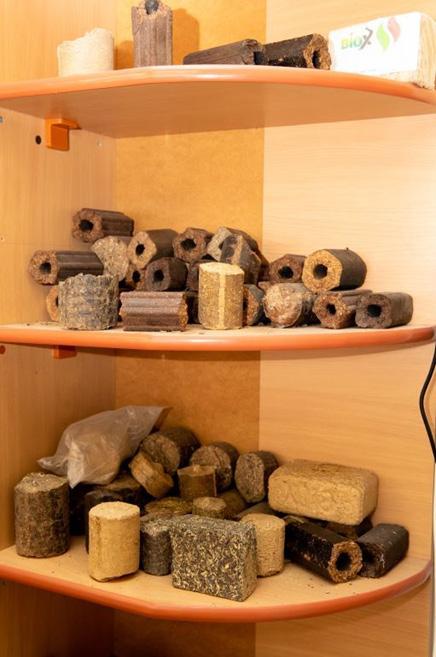
By using biomass boilers in public institutions, the consumption of gas may be reduced by up to 20 million m3 of gas a year
the re-accreditation of the Laboratory for testing biofuel quality, regulation of market placement and quality verification. Investment is planned to be made in operator training centres, involving biomass boiler operators. For the European Union, accelerating the uptake of renewables and energy efficiency remain the best solution for energy security and climate ambitions.
With a budget of €10 million, the “Addressing the impacts of the energy crisis in the Republic of Moldova” programme helps fight climate change by reducing the impact of the energy crisis and mitigating the burden of energy poverty.

On 13 September 2022, the European Investment Bank (EIB) and the Ministry of Infrastructure and Regional Development of the Republic of Moldova signed a €15 million grant agreement funded by the European Union to support the Moldova Energy
Efficiency Project. The project will improve the energy efficiency of public buildings, including republican hospitals, schools, kindergartens and health institutions in Moldova.

Jānis Mažeiks, Ambassador of the European Union to the Republic of Moldova, said
“In the current circumstances, with high energy prices, any reduction in energy consumption translates directly into a significant reduction in energy bills. Investing in energy efficiency is a win-win strategy that increases the energy security of the Republic of Moldova, but also contributes to the country’s climate diplomacy agenda. The
signature of this agreement will help people and public institutions such as hospitals to cope with the energy crisis.”
EIB Vice-President Teresa Czerwińska, who is in charge of operations in Moldova, said:
“With
this new agreement we are delighted to foster and support the energy-efficient
refurbishment of public buildings in the Republic of Moldova. By supporting better energy performance, the reduction of CO2 emissions and sustainable urban development, the Bank and the European Union will contribute to safeguarding the environment and to improved living conditions for Moldovans. Furthermore, investing in energy efficiency increases the
energy security of the country. The ongoing military crisis in the region amplifies the need for Moldova to scale up its efforts in energy efficiency, energy security and the diversification of energy supplies. This project and our joint efforts are the right steps for the country to become more independent, competitive and resilient in energy issues.”
Andrei Spinu, Deputy Prime Minister and Minister of Infrastructure and Regional Development, said:
“Now more than ever, Moldova must strengthen its energy self-sufficiency. Because we are 75% energy dependent, we want to reach the goal of climate neutrality by 2050. Moreover, each project and
financial resource used effectively in energy resilience will serve as reinforcement in the face of future crises. Moldovan schools, kindergartens and hospitals are the target institutions for energy efficiency projects. We want to promote a big change in the energy sector, and we thank you for supporting us during this process.”

The Moldova Energy Efficiency Project supports improved energy efficiency as one of the initiatives of the Economic and Investment Plan of the European Union aiming to the Republic of Moldova with concrete investments to help post-pandemic recovery and improve the lives of Moldovan citizens. The total cost of the project is €94 million. It is co-financed by a €30 million loan from the EIB and a €30 million loan from the European Bank for Reconstruction
and Development (EBRD), and an in-kind contribution of €18.5 million from the Moldovan government. The European Union is complementing the project with €15 million in grants from its Neighbourhood Investment Platform (NIP) and €0.5 million from the Eastern Partnership Technical Assistance Trust Fund (EPTATF).
A further €28 million from the EIB can be deployed for the project in the future.

The Energy Efficiency Project in the Republic of Moldova aiming to improve the energy efficiency of public buildings in the country was launched.
The Ministry of Infrastructure and Regional Development of the Republic of Moldova, through the Consolidated Unit for the Implementation and Monitoring of Energy Investment Bank (EIB), 30 million euro - by the European Bank for Reconstruction and Development (EBRD), 15 million euro - by the European Union, 0.5 million euro – by the Eastern Partnership Technical Assistance Trust Fund (EPTATF) and 1.4 million euro – by the Government of the Republic of Moldova. The project will be implemented until 2025.
At the same time, the Parliament of the Republic of Moldova approved at the beginning of this year a list of nine pilot projects for large hospitals which will go through thermal rehabilitation as part of this Project. The list of the large hospitals

Projects and the Agency for Energy Efficiency, aims to make energy consumption of the buildings more efficient, giving priority to both municipal and state public buildings from across the country, and resulting in significant environmental benefits due to energy savings and reduced greenhouse gas emissions.
buildings was recently accepted by the
Currently there are conducted energy audits for the pilot projects, that will be followed by a feasibility study aiming to determine the requirements and mechanism to be applied for the Call for Proposals necessary to finance the thermal rehabilitation of public buildings owned by local and municipal public authorities (schools, kindergartens, hospitals, etc.).
Thus, all beneficiary institutions will reduce their energy consumption by at least 30%. In addition, the indoor conditions of the institutions will be improved as the ventilation, heating and cooling systems are enhanced. As well, a better access for people with special needs will be ensured.
Public
in the Republic of Moldova will be energy efficient with the financial support of the European Union and the Team Europe

EUGreenDeal4Moldova: Rising energy and food prices, security crisis, reformatting value chains, and climate change have resulted to Moldova’s need to aim for resilience and create the basis for a sustainable and inclusive development trajectory.
As a global leader, the EU continues to lead on international efforts, and in conjunction with Moldova, addresses environmental challenges and promotes the implementation of ambitious climate, environment and energy agendas.
Accompanying Moldova to transition towards a more sustainable development
pathway, EU support is channelled towards:
• Adapting to climate change conditions and minimizing the impact of anthropogenic activity on the environment, including the promotion of a green economy;
• Increasing energy autonomy, and security by using renewable energy resources, while reducing energy poverty.
Find more about EU support towards reducing the environmental footprint of human and economic activities on https:// eu4moldova.eu/eugreendeal/
The Award Ceremony of the most active pupils and municipalities who have participated in the European Sustainable Energy Week was organized by CoM-EastMoldova.

The Europe Café, which hosted the event, was attended by children and young people from
Signatory towns and villages from Gratiești, Ciuciulea, Albinețul Vechi, Pruten, as well as mayors, deputy mayors and representatives from Andrușul de Jos, Lozova, Giurgulești, Talmaza, Albinețul Vechi, Ialoveni, Vișniovca and Călărași Rayon Council.
The special invitees of the ceremony were Mrs Magdalena Müller-Uri, Head of the Operation Section of the European Union Delegation of Moldova, Mr Constantin Borosan, State Secretary of the Ministry of Infrastructure and Regional Development, hosted by Irina Plis, National Expert of the Covenant of Mayors in Moldova, gave a greeting and a message of thanks to the small and big promoters of energy efficiency at local level.
The Award Ceremony nominated the winners of the two competitions organized by the “CoM-East-Moldova” within the framework
of the European Sustainable Energy Week 2022 that took place in September 2022.
An impressive number of citizens of all ages took part in the competitions and various activities organized by local public administrations that demonstrated an extraordinary solidarity and willingness to contribute to a greater energy efficiency, cleaner energy and sustainability of our communities.
In the “More energy efficient to be cool!” photo contest 31 pupils from the signatories towns and villages took part.
The most active pupils and municipalities were awarded within the European Sustainable Energy Week in Moldova
12 signatories of the Covenant of Mayors took part in the competition for the most active municipalities in the framework of Energy Day and the European Sustainable
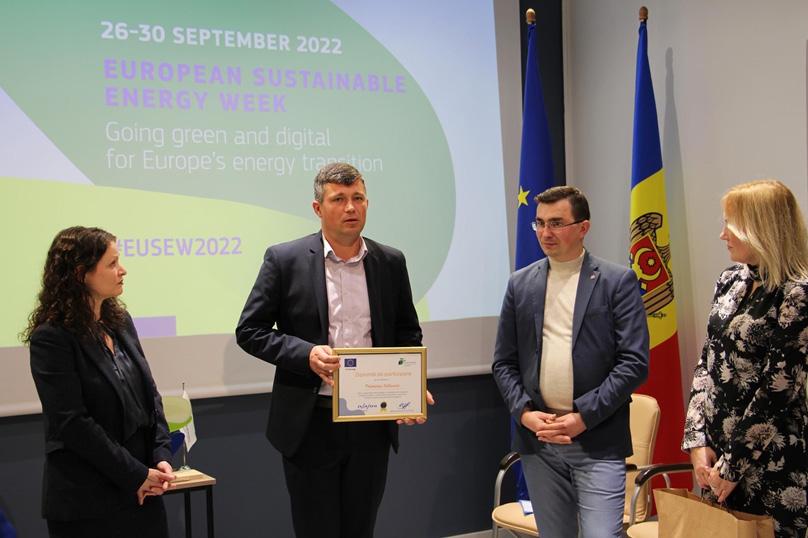
Energy Week 2022, implementing extensive educational activities in schools, kindergartens and in the community to promote energy efficiency.


Mayors, vice-mayors and specialists in energy management from around 20 local public authorities consolidated their knowledge on the development of Local Action Plans for Sustainable Energy and Climate during a two-day training. The participants represent new signatories of the Covenant of Mayors for Climate and
Nicolae Olari, Head of the Energy Policy Department from Ministry of Infrastructure and Regional Development of the Republic of Moldova, encouraged localities to develop and approve local energy and climate plans. According to the official, at the national level, new objectives will be set in the field of energy, energy efficiency and emission reduction, and the contribution from the
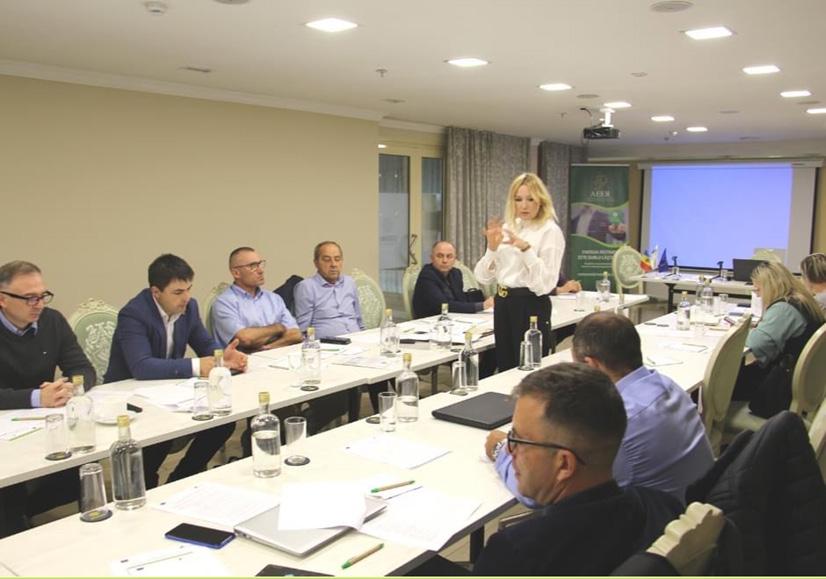
“Energy efficiency is today the essential concern not only for mayors, but also for all citizens”, noted Irina Plis, the national expert of the Covenant of Mayors in Moldova. “In this context, joining the Covenant represents a strong commitment and, in many cases, marks a new, long-term start in the sustainable development of the locality.”
As partners of the event, Technical University of Moldova hosted the second day of training, sharing the experience of the Energy Efficiency of Public Buildings Continuous Training Centre.

With the support of experts, as a result of the training, participants will be able to start or accelerate the process of implementing local Sustainable Energy and Climate Action Plans.
The training took place within the CoM East III project, financially supported by the European Union.

Representatives of the Delegation of the European Union, of the Ministry of
international stakeholders, participated in the second edition of the Municipal
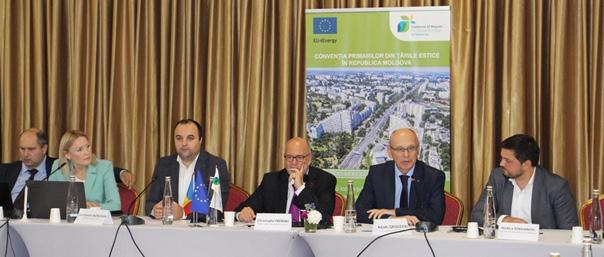
The meeting was organized within the Covenant of Mayors-East (CoM-East) project, implemented with the financial support of the European Union.
During the meeting, that took place on September 28, there were presented the objectives and new features of the 3rd phase of CoM-East project, the newly updated National Roadmap facilitating the investments in energy efficiency and climate. At the same time, the participants
energy efficiency, renewable energy sources and adaptation to climate change, etc.
The platform represents a framework for interaction between the signatories of the Convention of Mayors for Climate and Energy in Moldova and the main national and international stakeholders. The Platform meeting took place within the European Week for Sustainable Energy, being held simultaneously in several EU member countries and in the Eastern Partnership
The Republic of Moldova is strengthening its monitoring, verification, and reporting (MRV) capacities of greenhouse gas (GHG) emissions to ensure the increased transparency framework in the context of the Paris Climate Agreement and to unlock access to carbon finance. Member institutions of the Moldovan MRV system, including central, local public authorities and state enterprises, are participating during 31 October – 1 November in a training workshop, dedicated to GHG emissions inventory in the energy sector. The workshop is organized by the EU4Climate project, financed by the European Union, and implemented by UNDP Moldova.
sector and data analysis for national and municipal calculations of GHG emissions in the energy sector, etc. Recommendations were also formulated to improve the process of inventorying GHG emissions in the energy sector, including coordination mechanisms, improving data management procedures, adopting international best practices. The participants also applied their knowledge into practical exercises on the inventory greenhouse gases in the energy sector of the Republic of Moldova.
“The Republic of Moldova has a robust system for monitoring, verifying and reporting greenhouse gas emissions, approved back in 2018 and updated with the support of EU4Climate in 2021. However, due to reduced institutional capacity, the GHG inventory is conducted by a group by experts supported by development partners. Today’s training is the next practical step towards the gradual taking over by the Environment Agency of the responsibilities of implementing the MRV system,”
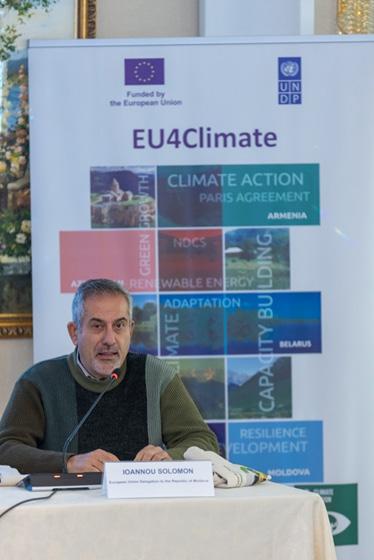
said Stela Drucioc, Head of the Air Policy and Climate Change Directorate within the Ministry of the Environment.
The workshop examines topics related to key international methodologies, guidelines, and best practices for calculating GHG emissions in the energy sector, key bottlenecks related to the preparation of the national GHG inventory in the energy sector of the Republic of Moldova, EU best practices in data collection from the energy
A similar training on data quality assurance was organized in the summer of 2022 and other workshops dedicated to the waste and forestry sectors are to be organized.
the Republic of Moldova
its
“The global energy crisis and skyrocketing energy prices are a challenge for the European Union as well as for the Republic of Moldova in meeting their climate targets. Such crisis however, does not lose focus, and the EU is supporting the Republic of Moldova both in overcoming the crisis and in pursuing its own climate targets,” said Solomon Ioannou, Programme Officer within the Delegation of the European Union to the Republic of Moldova.
The first cycle of reporting to the UN Convention on Climate Change (UNFCCC) Secretariat, based on the new MRV mechanism, began in 2020 and the first biennial reports on transparency will be transmitted by the end of 2024.
“UNDP and the European Union have joined efforts and support the Government of Moldova to better monitor its greenhouse gas emissions in line with the relatively new requirement set by the Enhanced Transparency Framework under the Paris Agreement, in order to form an

essential basis of reliable, transparent, and comprehensive information for understanding current emission levels, for raising the ambition, and tracking progress,” said Andrea Cuzyova, Deputy Resident Representative of UNDP Moldova, at the opening of the workshop.
With a total budget of 8.8 million euros, the EU4Climate project runs in the period of 20192022 and has the following components: ( I ) updating the National Contributions Determined to the Paris Agreement; ( II ) the development of national low-emission development strategies towards the year 2050; ( III ) introducing and strengthening the framework for monitoring, reporting and verifying greenhouse gas emissions; (IV ) alignment with the community acquis in the climate field; ( V ) integrating the climate dimension into sectoral policy documents, raising awareness and developing sectoral guidelines for the implementation of the Paris Agreement; ( VI) attracting climate change investments; ( VII) better climate change adaptation planning.
A medical microbiologist from the National Agency for Public Health performed the country’s first ever monitoring of SarsCov-2 virus in wastewater from Chisinau’s sewerage system with the support of the EU4Environment Water Resources and Environmental Data programme.

With the support of the programme, four Eastern partner countries (Armenia, Azerbaijan, Georgia and the Republic of Moldova) developed a COVID-19 monitoring concept (sampling, analysis and evaluation) under the guidance of experts from the Austrian Environment Agency and the Vienna University of Technology.
Over the coming months, EU4Environment Water Resources and Environmental Data will help experts in Moldova to implement the practice on a permanent basis and train them in interpreting the data. In parallel, sampling will be expanded to increase the coverage of COVID-19 monitoring. This will improve pandemic monitoring for overall health protection in each country and even internationally.
and other governmental bodies under the Ministry of Environment of Moldova.
The EU4Environment Water Resources and Environmental Data supports the Republic of Moldova in the development of an Integrated Environmental Data System. This will improve the collection, exchange and use of environmental data and information by relevant institutions, as well as facilitate public access to information on environmental data.
On October 10-11, experts from the International Office for Water (France) were in the Republic of Moldova to meet with Moldovan experts at the Environment Agency
The EU4Environment Water Resources and Environmental Data programme aims enabling EU’s Eastern Partner Countries green transformation in line with the European Green Deal and the Sustainable Development Goals (SDGs). The programme’s activities are clustered around two specific objectives: 1) support a more sustainable use of water resources and 2) improve the use of sound environmental data and their availability for policy-makers and citizens. It ensures continuity of the Shared Environmental Information System Phase II and the EU Water Initiative Plus for Eastern Partnership programmes. The programme is implemented by five Partner organisations: Environment Agency Austria (UBA), Austrian Development Agency (ADA), International Office for Water (OiEau) (France), Organisation for Economic Cooperation and Development (OECD), United Nations Economic Commission for Europe (UNECE). The programme is principally funded by the European Union and co-funded by the Austrian Development Cooperation and the French Artois-Picardie Water Agency based on a budget of EUR 12,75 million (EUR 12 million EU contribution). The implementation period is 2021-2024.
For more information, please access: https://www.eu4waterdata.eu/en/


Resilience, crisis response and recovery were the bold focus of the 2022 Eastern Partnership Digital Conference on 24th of October. The event built on the first Digital Conference in 2021 by zooming in on the priorities for digital transformation of the Eastern Partnership (EaP) region. With the ongoing Russian war of aggression against Ukraine, speakers highlighted concrete
solutions and tools at hand, sending a clear message: unprecedented actions are possible even in a challenging environment.
The digital transformation should be at the heart of the efforts towards recovery, resilience and reforms in the Eastern Partnership region.
Panellists and presenters addressed issues and opportunities around five key questions:
Digital governance: how to design services that citizens choose to use?
The demand for digital public services in Ukraine has increased due to displacement, loss of documents, and emergencies since February 2022. Valeriya Ionan, Deputy Minister for Euro-integration in the Ministry of Digital Transformation explained how the pioneering ‘Diia’ digital governance platform has already helped 18.5 million users. As an example, Ukrainians without documents can use the application to identify themselves, to report lost or damaged property, and to access rolling news. This work builds on years of Ukraine’s collaboration with the EU, but more remains to be done:
“It is very important for us to have the EU’s support, and to initiate new technical assistance projects that will help Ukraine recover.”
The Diia platform is an excellent example of how design and delivery of digitalised public services should stem from a citizen-centric mind-set, according to Nick Thijs, Senior Policy Adviser with the joint OECD/EU SIGMA Initiative. He stressed the importance of backing up such products with a complete policy framework to ensure high-quality digital governance is woven into a more general right to good administration.
Users of all kinds must be kept in mind when improving the experience of digital government services, according to Harmick Azarian, Digital Government Transformation Lead with the Ministry of High Tech Industry of the Republic of Armenia.
“We don’t just have citizens. We have people who have no documentation and ensuring their experience is also very important,”
he explained, adding that improving digital government services must not be dismissed as ‘merely’ design, so users turn to such services as a matter of choice.
In Moldova, where there are currently more Ukrainian refugees per capita than in any other country, stronger ties with private investors have led to the successful creation of a digital service to help find shelter, food and medical assistance.
“It was such a pleasure to work together with the private sector, co-developing digital tools to help refugees,” explained Iurie Țurcanu, Deputy Prime Minister for Digitalisation.
Digital infrastructure: how to align strategy with investment opportunities?
At least 80% of EaP citizens are to have full access to high-speed affordable internet in coming years. To achieve this, investment in digital infrastructure is key. Himmat Singh Sandhu, a Digital Development Specialistwith the World Bank observed that the global connectivity market is growing, and that major content providers (Amazon, Google, Microsoft, Facebook) use around 60%, rising to 80%, of the total international bandwidth. The Georgian government is prioritising high-speed broadband internet services in rural areas and securing private investment in telecommunications, the conference participants heard. The country has already made great progress towards harmonisation with the EU legislative and policy framework, and is very actively engaged in the EU4Digital Initiative.
“We hope to see Georgia as a part of the EU’s digital single market,”
emphasised Guram Guramishvili, Georgia’s Deputy Minister for Telecommunications and Information Technologies.
In Ukraine, Valeriya Ionan, Deputy Minister for Eurointegration in the Ministry of Digital Transformation emphasised that the restauration of the country’s digital infrastructure is a priority, as in many
areas this has been severely damaged or destroyed following the Russian war of aggression against Ukraine. Optical networks, mobile towers, lengths of cables and digital equipment that are crucial for digital communications have been affected.
Digital economy: how to bring digital transformation from start-ups to the entire economy?
The digital economy is defined as how we can use technological resources to generate wealth, according to Jesús Lozano, Member of the European Innovation Council and EU4Digital Senior Expert in Digital Economy.
“When we talk about the digital economy, we very quickly go into the need to develop start-ups. But we also need to empower clustering of businesses, we need to do digital transformation of established business,”
he commented, emphasising a broader focus needed than just developing start-ups.
Azerbaijan is geographically positioned between multiple regions “on the crossroads of international trade,” said Bakhtiyar Mammadov, the country’s Deputy Head of Administration of the Ministry of Digital Development and Transport. The country therefore sees the benefits of creating and strengthening cross-border digital links, looking into solutions for eTrade facilitation as well as digital transport corridors. Smart cities and villages were listed as further focus areas.
Armenia has also been prioritising the interoperability of data for citizens and businesses, so that different public agencies avoid repeating the collection of information. In addition, the country has tested how to recognise EU and Armenian e-signatures to facilitate smoother digital economy processes.
“We’re on that path and I don’t think there is any turning back now, so we will just take time to get there,” said Harmick Azarian.
With the support of EU4Digital, Moldova has been working on digitalising and simplifying customs services, to facilitate checks at the border crossing points. Iurie Turcanu stressed that the country is looking to become even more compatible with the EU – specifically with Romania, which is the primary commercial partner.
Digital skills: how to connect EaP progress with the EU as a benchmark?
Digital skills, technology and innovation are the three drivers behind the process of generating wealth using technological resources, Jesús Lozano said.
In Moldova “we started mostly with technology, and ended up with a lot of micro services interconnected – very powerful, very promising – but we didn’t invest that much in human capital,”
reflected Iurie Țurcanu. As a result, he noted, digital transformation had to be reconsidered as a process to account for digital skills development.
While the EU has set very clear targets for its Member States, Fabio Nascimbeni of the European Training Foundation noted that also in the Eastern partner countries the strategic documents recognise digital skills competences, capacities and capabilities as a priority. However, there is an uneven capacity to measure what it means to be digitally empowered, he said, adding that reaching the ambitious target of 1 million upskilled citizens in the EaP will require fully implementing a holistic region-wide monitoring system, similar to EU DESI, the Digital Economy and Society Index.
Cybersecurity: how to ensure resilience remains a backbone of digital transformation?
“With the war in Ukraine, we had to rethink completely our digital strategy,” added Iurie Țurcanu, noting that resilience of Moldovan administration had to be added as a new priority, along with the urgent need to strengthen the national cybersecurity system.
Cybersecurity is one focus of the joint EU and Council of Europe CyberEast regional programme, which offers tools to increase resilience against cyber-attacks. It covers not only technical preparedness, but also alignment of legal and governance frameworks with EU legislation.
“When it comes to cybersecurity challenges in Eastern partner countries, it is very important to articulate the differences between the countries. At the same time, we are all aware that many of the threats are similar,” observed Tanel Tang, Team Leader of the European Commission’s Support Group for Ukraine. For example overall hybrid threats, particularly disinformation were cited as such common challenges.
The EU has also mobilised €10 million to enhance the cyber resilience of Ukrainian institutions since Russian aggression began, with rapid response through the ‘EU Support to Strengthen Cyber Security in Ukraine’ project, covering software, hardware, critical infrastructure systems and evacuation. Furthermore, an additional €15 million has been allocated for resilient digital transformation.
“In cyberspace the borders are very vague, or sometimes they don’t exist at all,” said Tanel Tang, adding that experience with addressing cyber threats exists on both sides of the EaP-EU borders. This makes it important to continue bringing together different countries’ resilient digital transformation experts.
The achievements to date and plans for future activities of EU4Digital projects were reviewed in the 2022 EU4Digital Initiative Steering Committee meeting on 25th of October. Marking the official kick-off of the EU4Digital Facility Phase II, renewed for 3 years, this event brought together more than 100 stakeholders from across the EU4Digital ecosystem, including representatives of the EU4Digital Initiative projects, the EU and Eastern partner countries.
The EU4Digital Facility has been active since 2019 and is the central programme of the EU4Digital Initiative, which is an umbrella of projects representing the EU’s support towards a resilient digital transformation in the EaP region.

Representatives of the EU’s Directorate for Neighbourhood and Englargement (DG NEAR) who manage the EU4Digital
Initiative chaired the online meeting. Gérald Audaz, Team Leader at DG NEAR, reminded participants that the EU aims to bring the Eastern partner countries closer to the EU’s digital single market through the work of the projects under the EU4Digital umbrella.
This EU support is provided within the context of a renewed policy agenda and targets for the Eastern Partnership, which were confirmed at the 2021 EaP summit. A ‘resilient digital transformation’ is one of the five key areas. “The vision and targets developed in consultation with the Member States and Eastern partner countries last year build on the EU’s developments in this area,” stated Thibault Charlet, Programme Manager at DG NEAR. “The EU’s digital compass provides four key priorities of government, infrastructures, business and skills, while the EU Global Gateway Strategy
and the Communication on Ukraine Relief and Reconstruction of May 2022 serve as additional guidance.”
At the meeting, each project under the EU4Digital Initiative was invited to present their progress and plans for upcoming activities. The EU4Digital Facility, represented by Team Leader Arturas Piliponis of EY, reflected on the key achievements of Phase I. These were summarised as benchmarking studies and comparisons with EU best practices, the piloting of cross-border technical solutions for later full-scale development, and connections the project facilitated between EU and EaP stakeholders, other donors and their initiatives.
In the EU4Digital Facility Phase II, work will centre around 6 main thematic areas: Telecom Rules; eTrust and cross-border services; e-Trade; ICT Innovation and startup ecosystems; eHealth; and Digital Skills. In addition, two cross-cutting objectives are included. One is a focus on communication and building awareness of EU support to digital transformation through EU4Digtal, and the other focusing on crisis support was explained by Arturas Piliponis: “In the current context, the need was identified to include flexibility in our activities through an ad-hoc crisis response activity, to have the possibility to respond with support when identified and in coordination with the EU.”
The EaPConnect project focuses on connectivity between research and education facilities in the Eastern partner and EU countries, providing seamless links, services and collaboration opportunities for students, researchers and scientists. “The launch of a spectrum link between Moldova and Ukraine is a great achievement,’ stated Irina Matthews of GÉANT, EaPConnect Project (co-)Manager, while many unforeseen challenges such as the pandemic, the war in Ukraine and political instabilities in the region in recent years have meant the project had to adapt to new realities.
Looking at cybersecurity in the Eastern Partnership region, the EU4Digital: Cybersecurity East project recapped its highlights, represented by Team Leader
Besnik Limaj of GFA Consulting Group. Three key components of the project include the approximation of legislation and legal frameworks to the EU’s NIS Directive, the identification of Operators of Essential Services in line with the EU directive, and increasing operational capabilities for cyber incidents and crisis management. This project also faced challenges and the need to adapt to geopolitical realities, for example hosting a webinar on election security.
The EU4Digital Broadband Strategies project by the World Bank group, represented by Valeria Dessolis, provided an overview of its key achievements, including benchmarking studies, supporting broadband mapping and the improvement of legal and regulatory frameworks for broadband.
A follow-up project was announced – DG NEAR will put in place the ‘EU4Digital: Investing in Broadband Connectivity (20232027)’ project with a €5 million budget. This will support the preparation of broadband investment projects contributing to reducing the urban-rural digital gap and supporting the diversification and reconstruction of broadband networks.
The Eastern partner country representatives and EU delegations were invited to give their comments and feedback on the digital agenda and its implementation. Their priorities included the need for longterm investments, stressing that digital transformation is a lengthy journey of reforms. The gap of digitalisation in rural areas is also a concern, with a need to empower rural communities by providing access to the internet infrastructure and services. The need for a coordinated, central plan was also stressed, with a need to tackle key areas and avoid a fragmented approach.
Areas of cybersecurity, government platform interoperability, ICT sector empowerment, e-Commerce, digital skills, and digital infrastructure were further topics that were defined as important to the Eastern partner countries. These are also covered by the EU objectives that will be tackled through the EU4Digital projects in the coming years.
Promoting the digital economy and society in the Eastern Partnership (EaP) was the focus of the EU4Digital Facility since 2019. Continuing this focus, but refreshing its objectives in line with the 2021 EaP policy agenda, the second phase of the EU4Digital Facility has officially begun. The EU4Digital Facility aims to extend the benefits of the Digital Single Market to the Eastern partner countries and is the central programme of the EU4Digital Initiative, the EU’s flagship regional programme to support digital transformation in Eastern partner countries.
To mark the re-launch of the EU4Digital Facility, the EU4Digital Initiative is organising two online events: the Eastern Partnership Digital Conference on 24 October, and the EU4Digital Phase II Kick-off and Steering Committee meeting on 25 October 2022. Developing a stronger digital economy
and society will generate more jobs and economic growth, helping businesses and improving the lives of citizens in the Eastern partner countries. Policy updates for the Eastern Partnership, which were confirmed in December 2021, renewed the EU and Eastern partner countries’ commitment to resilient digital transformation. The EU4Digital Initiative supports this objective and the harmonisation of digital markets through its activities in digital infrastructure, e-Governance, digital economy and innovation, and cyber security and resilience. EU4Digital Initiative activities are conducted in close cooperation with six EU4Digital networks.
The EU4Digital Facility Phase II (20222025) will build on the achievements and foundations of the first phase. The EU4Digital Facility Phase I (2019-2022) focused on

enabling a stronger economy and stronger governance in the Eastern partner countries through digital transformation by developing recommendations and frameworks, facilitating agreements and policy notes and the piloting of key digital solutions, such as digital signature, e-Invoice, e-Customs and e-Commerce.

Over the next three years, the EU4Digital Facility Phase II will continue to focus on six main policy areas: Telecom Rules, e-Trust and Cross-Border Digital Services, e-Trade, ICT Innovation and Start-up Ecosystems, eHealth, and Digital Skills. These are structured according to the Eastern Partnership (EaP) policy pillars of Digital Infrastructure, e-Governance, Cyber Resilience, and Digital Economy and Innovation.
The Eastern Partnership Digital Conference is an annual milestone event to review the Eastern Partnership digital policy agenda and upcoming priorities. Key topics relating to digital transformation in the Eastern Partnership will be explored through discussions with representatives of the partner countries and the EU. The conference will also touch upon the latest developments and challenges for the Eastern Partnership and the role of digital to tackle those challenges and support the path towards resilient and sustainable government, economy and society. This online event welcomes all participants who wish to register for the conference.

At the second edition of the Innovative Teachers’ Gala, an event organized by EU4Moldova: Startup City Cahul and “Tekwill in Every School” programme, in collaboration with several private companies from the Republic of Moldova, 22 of the most innovative teachers in the country were awarded for the outstanding results obtained in the process of education, after they succeeded in implementing interactive teaching methods and promoting digitization. The nominated teachers were selected from the more than 1,000 educators across the country who have successfully completed “Tekwill in Every School”’s summer training programme.
Among the award-winning pedagogues is Silvia Machidon, art teacher and director of the “Mihail Sadoveanu” Theoretical High School in Giurgiulești village, Cahul rayon. Transforming the high school from the ground up in just one year, she proved that teachers are capable of moving mountains to give students equal opportunities to study. At the same time, Silvia Machidon constantly encouraged teachers to improve themselves in the field of future professions. Thus, the 250 high school students have the opportunity to study 8 optional courses.
during the “Innovative Teachers’ Gala”
“In recent years, the social context itself pushes us to change some things, because children also see learning and teaching differently. Involvement in the “Tekwill in Every School” programme brought a new approach. It somehow motivated the students to discover something new. By accessing these courses, they understood that they can get help, a pre-training for the profession they want. Even now, most young people wish a future in the IT field or in other fields, but, of course, related to digital technologies”, says Silvia Machidon, who was awarded in the “Excellence in Leadership” category.
Another teacher from the south of the country was awarded in the “Excellence in innovative teaching methods” category. As a teacher of computer science and mathematics at the “Mihai Eminescu” High School in the Cantemir town, Natalia Popa studied Graphic Design, Web Development within the “Tekwill in Every School” programme. She turns students’ dreams into reality and believes in their potential, being not only a promoter of future professions, but also of digital transformation. Natalia Popa implements the “flipped classroom” teaching model during the lessons.
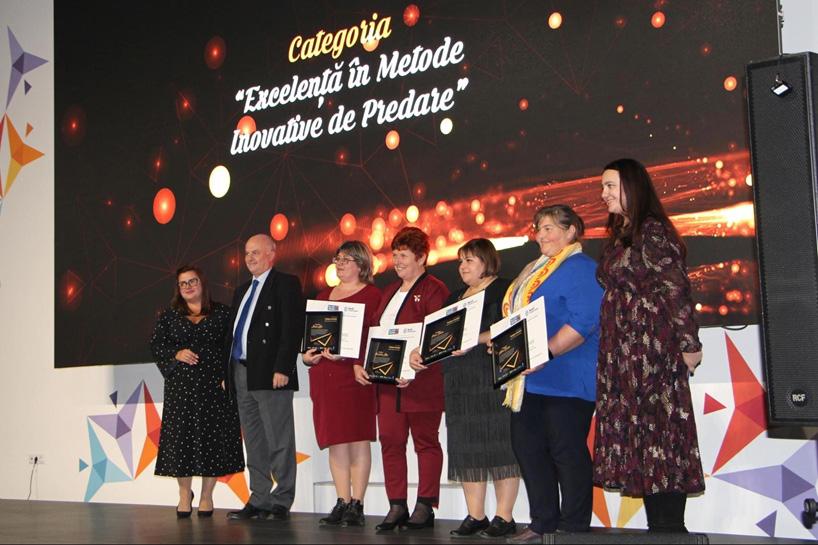
“The flipped classroom is a model where learning is student-centered and the teacher becomes the guide. We are the ones who moderate the students’ activity during the lessons. Students receive homework at home and certain activities are prepared in the classroom where they prove what they have learned at home,” said Natalia Popa.
Each winner of one of the 7 categories of the gala received a prize worth 10,000 MDL, offered by the companies Allied Testing, QSystems, FBS Group and Mind the Value. The 7 categories of the gala were: transformation of education through volunteering; development of the young generation of specialists; excellence in training programmes; excellence in innovative teaching methods; excellence
in leadership; ambassador of digital transformation; “Tekwill in Every School” ambassador.
“Due to innovative projects, such as the “Tekwill in Every School” programme, the learning infrastructure has been modernized, and both students and teachers have free access to intelligent digital education in innovative learning spaces. Today’s teachers can be considered digital ambassadors and vectors of transformation in education”, said Iurie Țurcanu, Deputy Prime Minister of Digitalization.
Just one year after the launch of the most revolutionary educational project in the country – “Tekwill in Every School”, approximately 1,000 teachers followed a complex training programme to bring the disciplines of the future into schools, including: Graphic Design, Web Development, Algorithm Programming in C/C++, Artificial Intelligence, Mobile Application Design and Development and Entrepreneurship, Video Storytelling and Emotional Intelligence in Communication. Thanks to the dedication and vocation of the teachers, approximately 50,000 students have access to optional courses aligned with the current demands of the labor market.

“I would like to celebrate today what you do every day, because you are not only teaching for the future, but also for the present. You make difference every day for children, for communities. When we see the complete picture, we notice a very interesting transformation that is happening in Moldova through this programme”, said Catarina Nilsson, Program Manager/ First Secretary at Embassy of Sweden in the Republic of Moldova.
“Teachers play a very important role in Moldova’s road to the digital transformation of education, raising a new generation of young specialists that the country needs.(...) I am honored to see that teachers from the southern regions are taking the initiative in terms of integrating of innovative teaching methods, not only in their classes, but also as national trainers”, said Boris Filipov, Project Manager of the EU Delegation in the Republic of Moldova.
The “Adopt an Innovative Teacher” campaign is supported by Allied Testing, QSystems, FBS Group and Mind the Value.
The organizers of the „Adopt an Innovative Teacher” campaign are the National Association of Companies in the Field of Information and Communications Technologies (ATIC), the Tekwill in Every School programme and EU4Moldova: Startup City Cahul.
EU4Moldova: Startup City Cahul is a project implemented by ATIC with the financial assistance of the EU and in partnership with the Embassy of Sweden. In particular, it supports economic development through innovation, entrepreneurship, employment in small and medium-sized enterprises outside the capital and provides study opportunities for students, young people, girls and women in science, technology, engineering and mathematics (STEM).
19 employees of the Cahul Mayoralty attend Digital Competencies courses, which will help them develop skills in using technologies, digital tools and resources in
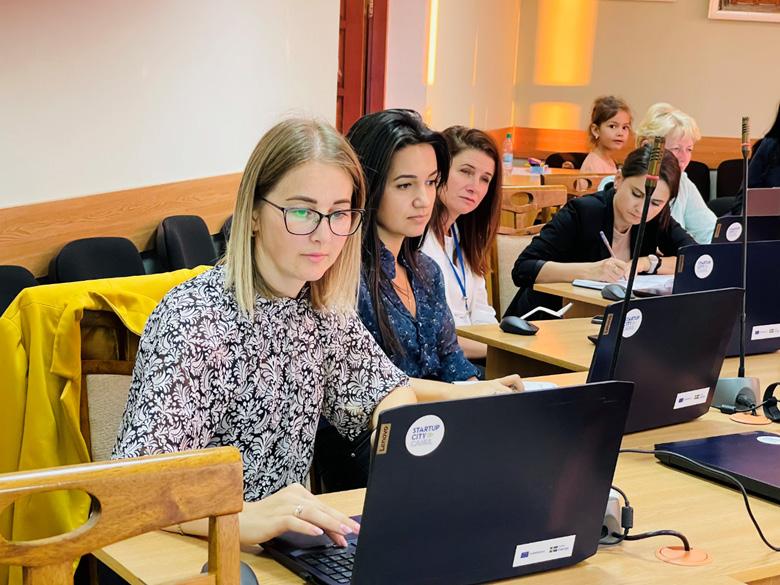
the social sphere. The classes take place in the Cahul town hall, between September 20 and December 29.
Because working at the mayoralty involves managing a large volume of data, the courses will be of great help to employees who want to streamline their work process and discover the possibilities offered by the digital tools available to them.
“The course in the field of digital skills will increase the level of training of employees to keep up with the radical transformations imposed by digitalization. Vocational training for acquiring or deepening digital skills will greatly facilitate the process of working with documents,” points out Natalia Bînzari, main specialist (human resources service) within the Cahul Mayoralty.
The Digital Competencies courses include several modules, in accordance with The Digital Competence Framework of the European Union, and namely: information and knowledge of data; 2. communication and collaboration; creation of digital content; information security; solving technical problems.

In addition to the standard programme, considering the working format of the employees, two workshops will be included. The first concerns the use of digital tools
and communication platforms in work relationships. The second workshop will focus on cyber security, which is particularly important in the context of protecting all categories of data against theft and damage. The courses are conducted in a tripartite format. Their cost is paid equally by the Cahul Mayoralty, its employees and subsidized by the EU4Moldova: Startup City Cahul project, which is implemented by ATIC and financed by the European Union in partnership with the Embassy of Sweden
Similar courses were also organized in Cahul in May and June 2022, the beneficiaries being several teachers, as well as other
people interested in the development of digital skills.
Because of the technological progress, teachers in the Republic of Moldova are increasingly motivated to offer their students training in step with the changes taking place in this field. It also happens in the rural areas, where teachers make considerable efforts to enhance opportunities for students to study digital subjects. An example in this sense is the “Mihail Sadoveanu” Theoretical High School in the Giurgiulesti village, which, for a year, managed to be transformed from the ground up. The 250 students from the institution can study 8 optional courses, including Graphic Design, Web Development, Entrepreneurship, Emotional Intelligence in Communication and others.
With dedication and a lot of effort, Silvia Machidon, the director of the “Mihail Sadoveanu” Theoretical High School, became one of the 22 teachers designated by EU4Moldova: Startup City Cahul and “Tekwill in Every School” as the most innovative in the country, proving that education in rural
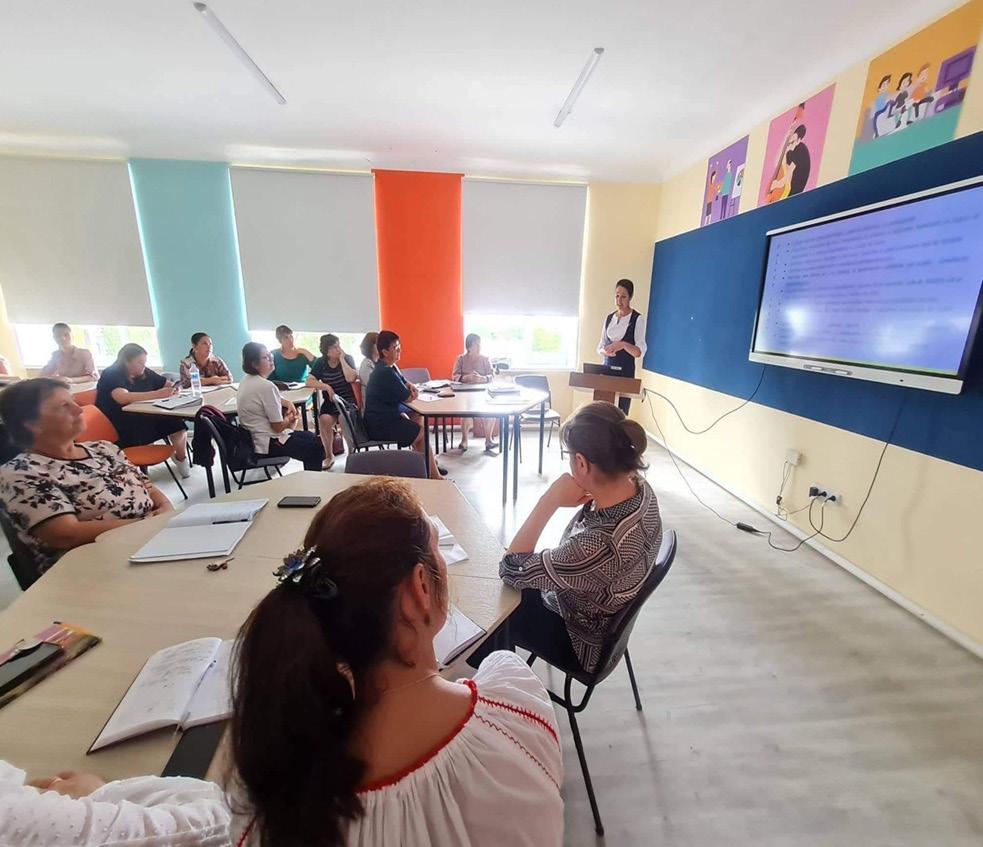
“Being a rural locality, these courses have opened many opportunities for children from the countryside. If in urban areas we are talking about certain centres where children can get involved for a fee, in the countryside this is more difficult. And these courses were very welcome. Following the implementation of the project, we also benefited from substantial equipment, the digital laboratory allowed the creation of a modern space, in line with the students’ expectations, a colorful and creative space, with technologies and comfort. Students are interested to come. Even if sometimes we don’t manage to fit into the schedule, the children have unlimited access. They can also go to the laboratory by themselves. Here they can work, develop their ideas”, says Silvia Machidon.
Thus, students complete their digital skills by studying different programmes and applying the new knowledge. All this happens with the help of teachers who have attended specialized courses and who guide students to use technologies effectively and safely. The art teacher, Silvia Machidon, became one of the first high school teachers to attend Graphic Design courses.
Aware of the need for a space that would offer students the opportunity to study the subjects of the future, the principal entered the high school in the competition for the endowment of a “Digital Laboratory”, and later, the institution was selected to participate in the “Digital School” programme, benefiting of a digital transformation strategy applicable to all study disciplines.
“Teaching art is related to design, beauty, and creation. We approached this aspect from a digital point of view. I saw some things from a different perspective, I understood what the graphic designer profession consists of, I liked it and put all the effort to acquire skills and form new competencies, and here I mean the digital ones, creativity, connections, a more innovative approach of things”, says the High School principal.
Beyond the endowment with new technologies, the teaching methods in the “Mihail Sadoveanu” Theoretical High School in the Giurgiulesti village refer also to transformations. Thus, one of the training strategies implemented is the „flipped classroom”. This pedagogical style moves activities, including those that might have traditionally been considered „homework,” into the classroom. In the case of a flipped class, students learn by themselves at home, and in class work on various projects under the guidance of the teacher.
Inspired by the transformations that took place in the high school, Silvia Machidon wants the institution to progress further, being convinced that the future of education is a digital one.
Due to the projects developed by EU4Moldova: Startup City Cahul and “Tekwill in Every School”, in the southern region of the country, an increasingly number of pupils and teachers have access to innovative teaching and learning methods. Nine institutions have already a digital laboratory, and in another six middle and high schools, they are to be equipped during this school year.
EU4Moldova: Startup City Cahul is a project implemented by ATIC with the financial assistance of the EU and in partnership with the Embassy of Sweden. In particular, it supports economic development through innovation, entrepreneurship, employment in small and medium-sized enterprises outside the capital and provides study opportunities for students, young people, girls and women in science, technology, engineering and mathematics (STEM).
A lot of pupils, students, teachers, entrepreneurs and IT specialists participated in the second edition of Innovation Talks Cahul. During the event, the subject of innovations in education was addressed, a particularly current topic given that today’s technologies offer a new perspective to classrooms and transform the way the training process is carried out.
Among the Innovation Talks guests were Sergiu Cornea, the Rector of the Cahul State
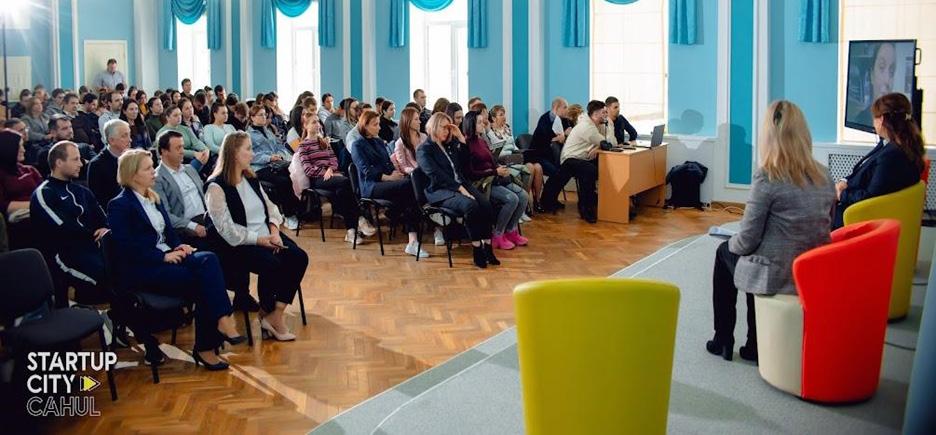
University “B. P. Hasdeu”, Vladislav Reșitca, Vice-rector for didactic activity of the Technical University of Moldova, Veronica Sireteanu, Deputy Director for Advocacy and Business Development at the American Chamber of Commerce in Moldova, university lecturers from the “Ion Creangă” State Pedagogical University and the Academy of Economic Studies of Moldova, as well as practitioners from various fields.
The speakers highlighted the methods and techniques that transform the processes of instructing and training of the future professionals, taking into account the new applied technologies, the generations of digitally native students and customers, and the collaboration between educational institutions and potential employers.
Another topic approached during the second edition of Innovation Talks Cahul was the application of innovations in the processes of training of the economic and financial specialists, as well as of the future engineers. At the same time, the experts also referred to ways the training of IT specialists can be adapted to the transformations and innovations in the field.
“Dual technical education is an innovation in the training of engineers, which is run based on an employment contract and combines professional training that is organized by an economic operator and takes place within an educational unit”, said Eduard Mocanu, Head of HR department, Draxlmaier Cahul.
At Innovation Talks, special attention was also paid to the application of innovative techniques and methods in the training of students and future teachers.
2nd edition of Innovation Talks, organised in the southern region of the country with the EU and Team Europe support
and teachers have access to innovative teaching and learning methods. Nine digital laboratories were opened in the schools in the southern region and another six are about to appear in the near future.
At the same time, hundreds of students from the south of the country participate in thematic workshops, as well as courses in robotics, programming and graphic design.
learn programming languages and graphic design, as well as accumulate new knowledge about artificial intelligence, creating mobile applications, entrepreneurship, intelligence in emotional communication and Video storytelling.
Innovation Talks is an initiative realized by the Cahul State University “B.P. Hasdeu” within the EU4Moldova project: Startup City Cahul, a project financed by the European Union, in partnership with Sweden and implemented
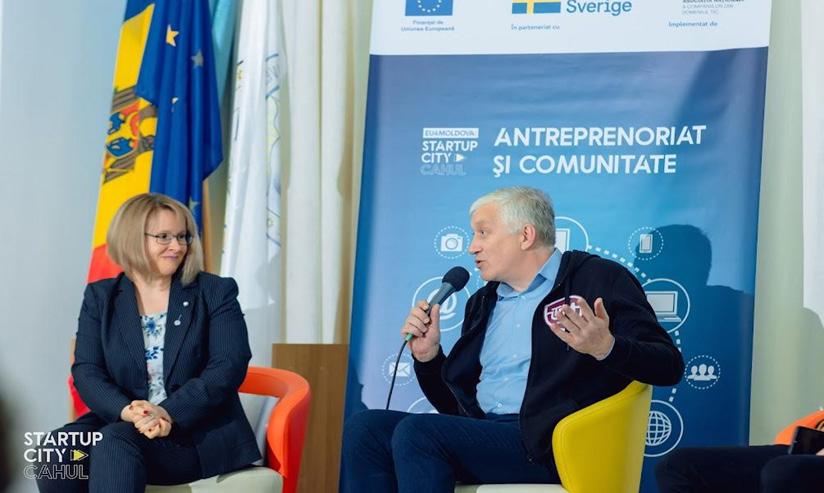

This newsletter is produced within the framework of the project “Visibility of EU and EU assistance in 2022 in the Republic of Moldova”. The project is funded by the European Union and implemented by the Particip GmbH.
Contact data: The European Union Delegation to the Republic of Moldova: Delegation-Moldova@eeas.europa.eu

Editorial team: Svetlana Japalau, Team Leader, Particip GmbH svetlana.japalau@particip.com
Natalia Ionel, Key Expert, Particip GmbH natalia.ionel@particip.com
The content of this publication is the exclusive responsibility of Particip GmbH and the editorial team, and it does not in any way reflect the official opinion of the European Union.
